

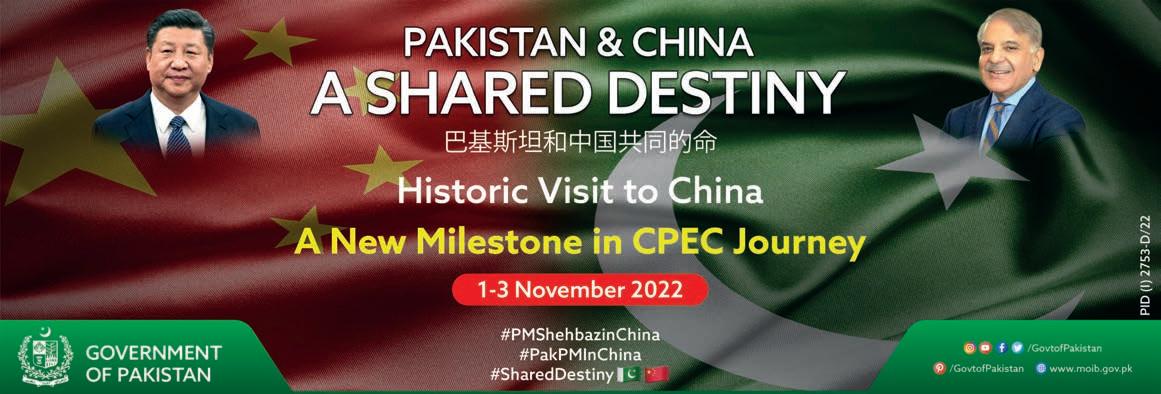




PRIME Minister Shehbaz Sharif Monday announced a special package of Rs 1800 billion to promote agriculture sector and provide farmers particularly in the flood-hit areas free seeds, inexpensive loans and to bring down prices of fertilizers and electricity for tubewells.
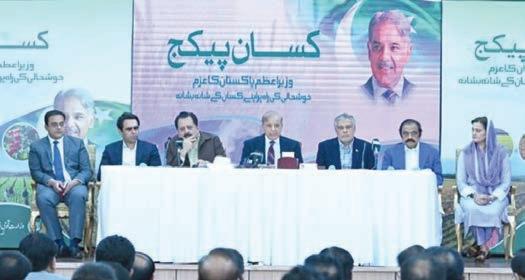
Announcing the agriculture package while addressing a press conference here, PM said the economic progress of Pakistan was dependent on agriculture sector and Rs 1800 billion spending on agriculture would be an increase of Rs 400 billion as compared to the last year.
The Finance Minister would ensure the delivery of loans to the farmers, he said adding Rs 10.6 billion were allocated for small farmers across the country while Rs eight billion would be given to the small farmers in the flood affected areas.
In the rural areas, unemployed youth in the agriculture sector will be given loans of Rs 50 billion and Rs 6.5 billion will be given for subsidy to waive off mark up on these loans.
He said the prices of DAP would be reduced by Rs 2500 per bag, resulting in benefit of Rs 58 billion to the farmers. The price of a DAP bag would come down to Rs 11250.
He said the prices of DAP were brought down after tough negotiations with the fertilizer sector, adding DAP had an important role in increasing the per acre yield of crops.
Shehbaz Sharif said 1.2 million bags of certified seeds worth Rs 13.20 billion would be distributed among the farmers and the federal and provincial governments would share the funds required for it.
The landless farmers in the flood affected areas would be given Rs 5 billion, he said adding small and medium enterprises working in the agriculture sector would also be given
loans of Rs 10 billion for modernization schemes. He said second hand five year old tractors would be imported with a relaxation of 50 percent in duties and the government would also encourage entry of new tractor manufacturers by decreasing duty on completely knocked down kits from 35 percent to 15 percent.
He informed that half a million tonnes of urea will be imported at a reduced price. 200,000 tonnes of urea had already been imported and the government would give subsidy of Rs 30 billion to give the fertilizer to the farmers at a lower cost, he added.
He also said the government would import 2.6 million tonnes of wheat. :”One million tonnes was already imported while 1.6 million tonnes of wheat will be imported soon.”
The prime minister said one million tubewells in the country were run on electricity and under the new package the government would provide interest free loans for 300,000 tubewells for their solarization so that farmers
would get free of cost electricity.
Despite all the difficulties, the government had decided to fix electricity cost at Rs 13 per unit for these tubewells and it would also pay subsidy of Rs 43 billion to help the farmers in paying the loans for the solarization, he noted.
The prime minister recalled that the last government of Prime Minister Nawaz Sharif also gave financial support of Rs 100 billion to the small farmers.
The new package would help in rehabilitation of farmers, particularly those whose standing crops including rice, sugarcane, wheat and dates, on four million acres were destroyed by the floods, he observed.
He said financial assistance of Rs 88 billion was already given to the flood affected people, adding Rs 70 billion were given through the Benazir Income Support Programme while the remaining amount was given for material help like food, tents and blankets through the National Disaster Management Authority (NDMA).
Foreign Minister Bilawal Bhutto Zardari will represent Pakistan at the SCO Council of Heads of Government (SCO-CHG) meeting scheduled to be held in Beijing on today. The SCOCHG will be held in a virtual format owing to the COVID-19 pandemic restrictions.
The CHG will be chaired by the Premier of the State Council of the People’s Republic of
China, Li Keqiang and attended by the heads of government from Kazakhstan, Kyrgyzstan, Russia, Tajikistan and Uzbekistan. The heads of government of SCO observer states, i.e. Belarus, Iran and Mongolia will also attend the meeting.
The Council of Heads of Government is the second highest forum in Shanghai Cooperation Organization (SCO) that focuses primarily on the areas of trade, finance, commerce and socio-economic cooperation among SCO member states. The SCO’s cardinal objec-
tives include promoting mutual trust and goodneighborly relations among member states, strengthening regional peace, security and stability. The upcoming CHG meeting will deliberate upon vital regional and global issues of interest, adopt a Joint Communiqué and approve the SCO’s budget for 2023. It will also discuss a comprehensive matrix for productive cooperation in trade and economy, transportation and connectivity, science & technology, climate change, culture, energy and tourism.

Prime Minister Shehbaz Sharif will leave Pakistan today for two-day trip to China, his first state visit to the neighbouring nation after assuming office in April, where he will meet President Xi Jinping, just a week after he cemented his place as the most powerful Chinese leader since Mao Zedong. The Foreign Office said it would be a two-day trip, being undertaken at the invitation of Sharif’s Chinese counterpart Li Keqiang, and that Sharif would be joined by Foreign Minister Bilawal Bhutto-Zardari and high-ranking officials of his administration. The visit follows Sharif’s meeting with Jinping on the sidelines of the Shanghai Cooperation Organisation (SCO) summit in Uzbekistan on September 16. It represents the continuity of frequent leadership-level exchanges between Pakistan and China. In Beijing, the prime minister will meet Jinping, and hold delegation-level talks with Keqiang. During the engagements, the two governments will review the so-called “All-Weather Strategic Cooperation Partnership” and exchange views on regional and global developments. Sharif is also likely to raise its debt issues after the country asked China to roll over its $6.3 billion debt on Saturday. The two nations signed a loan facility agreement in June, with Chinese banks lending $2.3 billion to Pakistan to help boost its reserves.The visit is also expected to advance the wide-ranging bilateral cooperation agenda with the conclusion of a number of agreements in diverse fields. Meanwhile, a spokesperson of the Chinese foreign ministry, Wang Wenbin, said Sharif was among the first foreign leaders to be invited to Beijing after last week’s Communist Party congress, at which Jinping secured a third term as its chief and unveiled a new leadership line-up. “China and Pakistan are all-weather strategic partners and ‘hardcore’ friends,” Wang told reporters in Beijing on Wednesday, according to South China Morning Post. “China looks forward to working with Pakistan to use this visit as an opportunity to further promote all-weather and high-level strategic cooperation, to build a closer China-Pakistan community with a shared future in the new era, and to make greater contributions to maintaining regional peace and stability, and international fairness and justice.”
The security forces on Monday killed four terrorists during a heavy exchange of fire during which two soldiers of Pakistan Army embraced martyrdom amid an Intelligence Based Operation (IBO) that commenced in general area Kaman Pass near Shahrig, Balochistan to clear a hideout of the terrorists. According to the Inter Services Public Relations (ISPR), the IBO had been initiated since October 30 where the Security Forces were heli dropped near suspected location of terrorists to cut their escape routes and clear the hideout. However, during the establishment of blocking positions, terrorists opened fire onto the Security Forces, resulting into Shahadat (martyrdom) of Sepoy Shafiullah and Sepoy Muhammad Qaiser. While a cache of arms and ammunition including Improvised Explosive Devices (IED) have been recovered from the terrorists. The ISPR further said the clearance operation, however, continued to apprehend other terrorists in the area.
Former prime minister and Pakistan Tehreek-e-Insaf (PTI) chairman Imran Khan Monday asked ‘those in power’ to stand with the nation against corrupt coterie as he resumed PTI’s long march to Islamabad from Kamoke.
Addressing the crowds on the fourth day of the PTI’s Haqeeqi Azadi march, while commenting on the rumours of talks with Prime Minister Shehbaz Sharif, Imran said that he has a message for those who had “given him [Shehbaz] permission to be in office”.
“Those in power must consider who the people they are standing with,” he said and asserted that the people of Pakistan were voting for his party in successive by-polls, referring to his recent electoral victory in NA-45 (Kurram).
“The establishment never stands against the nation because the populace and the armed forces strengthen the country together,” he said, urging the powers-that-be to not support “thieves”.
The PTI chief also clarified that he had criticised the army because he is “a Pakistani who lives in
and would die in Pakistan”, and did not “run to London” when there was a case against him, referring to PML-N supremo Nawaz Sharif.
On the occasion, the ousted premier said that he will file a defamation suit of Rs10 billion against Chief Election Commissioner (CEC) Sultan Sikander Raja for questioning his integrity.
He maintained that he would file a suit against the CEC for raising doubt about his integrity and honesty in the Election Commission of Pakistan’s (ECP) decisions in prohibited funding and Toshakhana cases.
Referring to the CEC, Imran said that he will take him to court and “make you pay so that in the future you do not destroy anyone’s reputation on someone else’s instructions”.
He furthered that the money he would win in the defamation suit against Raja would go towards treatment for patients at Shaukat Khanam hospitals across the country and for students’ education at the Namal University and Al Qadir University.
He claimed that the electoral watchdog’s decisions against him in the Toshakhana and prohibited funding references were given on the
directions of the “imported government”.
Earlier, Imran highlighted that he had witnessed a “revolution” taking over the country, as he continued his long march for the fourth day.
Taking to his official Twitter handle in the early hours of the day, the deposed premier questioned if the “revolution” which had been going on for “six months” would be a “soft one through the ballot box or a destructive one through bloodshed”. ‘InstItutIons strong when people support them’: Addressing the courts, Imran said that the entire nation was looking to them for justice. He thanked the chief justice of Pakistan for hearing Azam Swati and Shahbaz Gill’s pleas regarding the physical torture against them.
“The country will be strong when the institutions are strong, and institutions are only strong when then nation stands with them,” he said, reiterating that the institutions would lose all power if the people opposed them.
He further stated that now was the time for the people to decide, adding that justice would free the people.
Imran urged his supporters to follow him to Islamabad however possible, in any vehicle.
“Come on foot if you must. This is the war for freedom, and everyone must make sacrifices,” he said, analogising the sacrifices to those made by migrants during the India-Pakistan partition movement for freedom from colonisation.
He maintained that the nation would not be prosperous until there was justice, and equated justice to freedom.
Imran then asked the attendees at the march to take an oath in support of the struggle for Haqeeqi Azadi. The oath was administered by Faisal Javed who encouraged the crowds to be so loud that they were “heard in London”.
The crowd was asked to raise their hands and vow to obey the Constitution and protect the selfsufficiency and freedom of Pakistan and to not bow before anyone but the Almighty.
“We will struggle with Imran Khan till the end for the Jihad of Haqeeqi Azadi, and be prepared for any sacrifice,” Faisal read ahead while PTI supporters followed suit.
‘revolutIon through ballot or bloodshed’: Earlier, Imran highlighted that he had witnessed a “revolution” taking over the country, as he continued his long march for the fourth day.
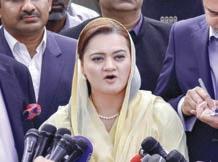 ISLAMABAD Staff RepoRt
ISLAMABAD Staff RepoRt
MINISTERfor Information and Broadcasting Marriyum Aurangzeb on Monday informed the National Assembly’s committee that efforts were afoot to make the advertisement policy more transparent.
“The ministry has worked out amendments to make the advertisement policy more transparent,” she said during the NA Standing Committee on Information and Broadcasting’s meeting, chaired by Javeria
Zafar Aheer.
She said the committee would be briefed about the amendments in detail at its next meeting. Marriyum informed the body that the ministry had revived radio commentary on T20 world cup after a gap of 13 years.
She said the Film Censor Board of 1979 was being changed drastically.
Film industry was already on zero taxation, she pointed out.
Expressing her shock and dismay over the tragic killings of Journalists Arshad Sharif and Sadaf Naeem, she said thorough investigations of the tragic incidents would be conducted and details would be shared

with the committee possibly in its next meeting. She regretted that one of the ministers of Punjab government had asked the husband of Sadaf Naeem not to take any legal action of the killing of his wife. The federal government would conduct transparent investigation to bring forth the facts, she added.
The protection and security of journalists would be ensured in the country, she said adding relevant laws were being made strict in that regard.
She said the Pakistan Tehreek-e-Insaf (PTI) government had imposed restrictions on journalists and made their life miserable
during its four year rule.
“The murder of a Pakistani journalist in Kenya is unacceptable,” the minister remarked.
The committee chairperson stressed on strengthening the defamation laws.
Pakistan Electronic Media Regulatory Authority (PEMRA) Chairman Saleem Baig said ban had been imposed on coverage of live speeches on electronic media, but allowed to telecast recorded speeches with effective delay mechanism in line with PEMRA code of conduct 2015.
At the outset of the meeting, the chairperson paid rich tributes to slain
journalists Arshad Sharif and Sadaf Naeem and prayed for their departed souls. The meeting was attended by Ms Nafisa Shah, Kiran Imran Dar, Zulfiqar Ali Behan and Maiza Hameed. Minister for Information and Broadcasting Marriyum Aurangzeb, Secretary Information Ms Shahera Shahid, Pakistan Electronic Media Regularity Authority (PEMRA) Chairman Saleem Baig. APP Managing Director Akhtar Munir and officials of Information Ministry and attached departments attended the meeting.
Chinese Ambassador to Pakistan Nong Rong Monday called on Federal Minister for Planning Development & Special Initiatives Professor Ahsan Iqbal and discussed projects related to the CPEC aimed the upcoming visit of Prime Minister Shahbaz Sharif to China. The meeting which lasted for an hour discussed the projects under CPEC, which will be taken up during the recent visit of Prime Minister Shahbaz Sharif in China. The minister emphasized the importance of several CPEC projects and reiterated that the government was committed to uplift the CPEC projects particularly, ML-1 and Karachi Circular Railways (KCR) projects. During the meeting, the minister highlighted the significance of ML-1 and Karachi Curricular Railways KCR projects which were considered to be a ‘strategic projects’. The minister said that all formalities had been completed in that regard including the approval of the Central Development Working Party CDWP and ML-1 would have a great economic impact on both Pakistan and China. “The delay in the ML-1 will affect our Railways track which is already in a dilapidated condition after the recent flood, ” said the minister, while emphasizing the importance of the strategic project. The minister also emphasized the importance of several other projects in different sectors like in Energy, Information Technology, Agriculture, Cultural and others which will be taken up during the premier’s visit in China to be scheduled on November 1. These projects have a great economic impact with Zero cost, said the Minister, while highlighting the importance of projects.
French Ambassador Nicolas Galey on Monday called on Chief Whip Senator Saleem Mandviwalla here and exchanged views on trade, investment and other issues of mutual interest. Mandviwalla said improving inter-parliamentary relations between the two countries would help enhance business and trade ties, adding that he looked forward to see more interaction among the members of the Pak-France Friendship Group. The chief whip also hoped to see the Pakistan-France Business Alliance play a more active role in promoting trade activities between the two countries. The ambassador said that he was pleased to see French companies operating in Pakistan and also expressed his satisfaction on the manufacturing of Peugeot in Karachi. He also congratulated the senator on Pakistan’s removal from the FATF’s Grey List and said France had immensely supported Pakistan on the issue.
Federal government is all set to launch three solar power projects of 2,400megawat (MW) in South Punjab and the Central Development Working Party (CDWP) has approved above Rs 6 billion amount for the land acquisition of these solar power projects.
Sources in the power sector said that the government has started the process to install 2400MW solar power plants in Layyah, Muzaffargarh and Jhang district of south Punjab. To materialize the plan, a meeting of CDWP which was held on 28th October 2022 had approved Rs 6.616 million worth heavy amount for the land acquisition
of 2400MW solar power projects to be installed in three districts of south Punjab. They said that though there was no allocation of funds in the Public Sector Development Program (PSDP), the government is going to start the solar power project worth approximately Rs 6 billion and 7 core as it has granted out of the way approval for ensuring availability of cheap electricity in the country.
However, they also said there will be a capacity trap with the installation of these 2400MW solar power projects because various power plants will have to be kept closed for obtaining cheap electricity from these solar power projects. The country will have to face a new challenge of capacity trap with installation of 2400MW solar power plants and by obtaining cheap electricity from
Islamabad High Court (IHC) has stopped the Election Commission of Pakistan (ECP) from holding a by-poll in NA-95 (Mianwali-I) constituency, a seat which fell vacant after the disqualification by the top election tribunal of former prime minister Imran Khan.
Days after disqualifying Khan under Article 63(1)(p) of the Constitution, the commission on October 24 denotified him as a member of the Parliament from the NA-95 constituency with “immediate effect”.
Following the ECP judgement, Khan pleaded to the
court to declare “misconceived” and set aside the order.
On Monday, the high court, while hearing Khan’s petition against his disqualification in foreign gifts, or Toshakhana, reference, removed objections raised by the office of the registrar on the petition.
Barrister Syed Ali Zafar, the counsel for Pakistan Tehreek-i-Insaf (PTI) chairman, urged the court to suspend the tribunal’s decision. However, Justice Aamer Farooq turned down the request and ordered the commission not to conduct the election for the time being.
The court also served notices on the ECP officials, directing them to respond to the assertions made in the plea by November 10.
them, said sources.
According to Ministry of Planning, Development & Special Initiatives’ working paper for Pre-CDWP, total Rs 2,658 million is required for acquiring 4,800 acres of land on Muzaffargarh-Gharmore road (at Sher Garh) tehsil Chobara district Layyah for installation of 1200MW solar power plant. And, land acquisition process will be led by National Transmission and Despatch Company (NTDC) while the proposed period of implementation is seven months (01-12-2022 till 30-06-2023). The main objective of this solar power project is acquisition of land for installation of 600MW solar power plant at district Layyah to displace the expensive fossil fuel-based power generation as per the decision of the Government of Pakistan (GoP).
ISLAMABAD Ghulam abbaSIn an ugliest example of how government organizations function in the country, Pakistan Halal Authority (PHA) an attached department of Ministry of Science and Technology (MOST) remains dysfunctional for around seven years. The PHA which was formed in 2016, is yet to operate for various reasons mostly the unnecessary bureaucratic hurdles and negligence on the part of the ministry which according to documents, scrapped recruitment in the authority for three times. It took years to approve service rules and business rules of PHA that too remained unimplemented. During a meeting of Senate Standing Committee on Science and Technology on Monday, which was chaired by Sardar Muhammad Shafiq, it was revealed that the organization was still dysfunctional despite having a Director General and 18 officials for the past couple of years.
During the briefing regarding the PHA since its establishment, the committee lamented the fact that the whole organization is still under a complete halt “how come 18 officials is running the whole institution that too only the administrative and clerical staff without any skilled workers,” Shafiq Tareen regretted.
The committee members remarked on the shut operations of the Institute and its recruitment that the recruitment process must be expedited and the ministry ensured to complete the process within a months’ time. The DG Hilal Authority Akhtar A Bughio informed the committee that it took him one and a half year to open the
Halal Authority account, the committee members remarked that the approval to open bank account can be given by Secretary Science and Technology. How did it take one and a half years for the account to be opened” the Chairman committee questioned and asked who should be responsible for this, the Chairman Committee directed to inquire into the matter. The PHA also said that he is the only officer working in the department and requires more officers from within the ministry to be a part of this project.
The Chairman committee instructed that nomination of 15 officers from within the ministry may be submitted for further decision. The committee sought time to time progress on the same. Senator Rukhsana Zuberi also recommended the PHA to establish countrywide slaughter Houses of International Level, which should be operational during EidUl-Adha in order to maintain hygiene and cleanliness.
She said that proper slaughter of the sacrificial animal and thereafter the cleanliness of the Holy offerings is as much sacred a part of religion and maintains the sacredness and integrity of the occasion. She said it will also prevent diseases from spreading because of the unhygienic environment created due to lack of proper mechanism for slaughter of the sacrificial animal. She said that other Muslim countries like Saudi Arabia all have slaughter houses operational and solely for the purpose of Eid-ulAdha. The committee received a detailed briefing on development and implementation strategies, plans and programs for promotion of import and export, trade and commerce with foreign countries and inter provincial trade and commerce in Halal articles and processes.
A Chinese delegation led by Mr Gao Qiang, Vice President of Sinovac Global, here on Monday met with Punjab Chief Minister Chaudhry Pervaiz Elahi and expressed willingness to invest 200 million dollars (about 45 billion rupees) in Punjab.
The Chinese company would set up a factory to manufacture plasma medicine products in Punjab which would cost about Rs 45 billion. It would also export
items worth US $ 500 million, Mr. Gao said.
On this occasion, the CM said that Sinovac company would be provided land on a priority basis in CPEC Industrial Estate Faisalabad. “I had laid the foundation stone of this industrial estate in my previous period which contains all the necessary facilities,” he mentioned. All the required facilities would be provided to the company in Punjab, he said and added that this project would not only benefit Punjab but also whole of Pakistan, and it would be carried forward
on a fast-track basis to ensure early completion. This project would create new employment opportunities and would become a new example for Pakistan-China friendship, he added.
Sinovac company’s plan to set up a factory to manufacture plasma medicine products in Punjab would be a milestone.
“The company’s willingness to invest billions of rupees in Punjab is very welcome. We thank Sinovac company for supplying vaccines to Pakistan during the Corona epidemic. Planning a factory to manufacture plasma medicine products in
Punjab is a big step,” he added.
Chairman Dean Holdings SM Naveed, Chairman Fazal Deen & Sons Suhail Ahmad Kabir, former president Bank of Punjab Hamesh Khan, secretary industries, secretary primary and secondary health, special secretary specialized healthcare and medical education, chief executive officer PBIT and others were present. The Chinese delegation included technical consultants Mr Sun Sicai, Mr Gu Hao, Mr Lu Feng, Ms Sun Shasha, Ms He Likun, Ms Li Zixuan and others.
The daughter of senior journalist Sadaf Naeem, Nimra Naeem, son Azan Naeem, uncle Naveed Bhatti and a close friend Marwa Ansar called on Punjab Chief Minister Chaudhry Parvez Elahi, here on Monday. The CM expressed heartfelt sympathies with them and offered Fateha for the departed soul. He presented a cheque worth Rs 5 million to Nimra Naeem as financial assistance. He also announced government jobs for the daughter of Nimra Naeem and husband of Sadaf Naeem as a photographer. Parvez Elahi paid tribute to Sadaf Naeem’s services in journalism and said: “We cannot bring her back but will continue to take care of her family in every way.” He said: “We are deeply saddened and share your grief in this hour of grief.” Sadaf Naeem was a hardworking and professional journalist and her services wold be remembered forever, he added.
Speaker Punjab Assembly Sibtain Khan, Provincial Minister Mian Mahmood-ur-Rasheed, Principal Secretary to Chief Minister Muhammad Khan Bhatti, Assembly Secretary Inayat Lak, Deputy Commissioner Lahore and officials were also present.
Pakistan Telecommunication Authority (PTA) has received Rs 11.43 billion equivalent to $52.44 million against the third annual installment of the license renewal fee from CMPak Limited (Zong) in line with payment terms of the license renewed in the year 2019. “The amount has also been deposited in Federal Consolidated Fund (FCF). With this deposit in FCF, the cumulative deposit by PTA in FCF during the current financial year i.e. 2022-23 has become Rs 22.98 billion equivalent to $106 million” said a statement of PTA here on Monday. PTA has so far deposited $ 1.79 billion equivalent to Rs 300 billion in FCF, received from cellular mobile license renewals and spectrum auctions since 2019.

THEBalochistan government is taking multiple steps for the up-gradation and development of irrigation system to boost the agriculture sector in the province and has worked out a comprehensive program to construct small dams for managing the incurring floods and recharge the ground water level.
In an exclusive interview after the devastating floods, Balochistan Minister for Irrigation Mir Muhammad Khan Lehri told APP that the provincial government had spent million of rupees on the development and expansion of command area of Kachhi canal to achieve the goal of irrigating more land of the province.
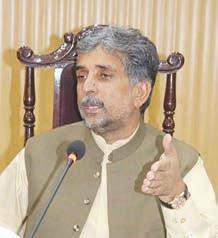
The Balochistan government had expedited the construction work on the establish-
ment of dams and also enhanced the allocation in Public Sector Development Programme (PSDP) of current fiscal year to
Chairman Senate Sadiq Sanjrani on Monday rejected a reference seeking disqualification of ex-prime minister Yousuf Raza Gilani in a Toshakhana case. According to the ruling of the Senate chairman, the allegations against Gilani were made while he was the prime minister and a member of the National Assembly, therefore Article 63(A) does not apply to the reference against him. The ruling further says Gilani was elected senator on March 3, 2021 and after the election of Gilani as a senator, the disqualification reference against him was not justified. The reference was filed by Senator Azam Swati alleging that then prime minister Gilani gave expensive vehicles to two important personalities from the Toshahhana.
Punjab highway patrol(PHP) has been granted resources for prevention of crimes and accidents on highways. Currently, 360 operational posts of PHP in Punjab. 14 PHP posts are under construction whereas summary for creation of 88 new Posts is also being sent to Punjab government.With the establishment of 88 new posts,performance of PHP will be enhanced. The Punjab Government has sanctioned law and order allowance and new vehicles for PHP. Likewise, 362 new vehicles will be provided to PHP for round the clock patrolling in concerned beat areas. Law and Order allowance has also been approved for encouragement and welfare of PHP personnel. PHP came into existence by incumbent CM Punjab back in 2003 with the motto of “Safe highways—Safe Punjab”. PHP performs it’s duties all over the Punjab, especially in rural areas. Since it’s inception PHP has been facing shortage of resources but now the incumbent government has decided to provide all possible resources for making it’s performance better. Laced with modern technology and other resources , PHP will be able to control crimes and prevent accidents on highways more effectively.
resolve the water scarcity issue in the province, Lehri added.
He said the completion of these projects would help the irrigation system besides tackling the water scarcity situation in the province. He said work on the Naulong Dam on Mula River in Jhal Magsi would start soon and plans were also under way to set up a hydro-power plant to generate electricity from the dam.
The government had to expedite the construction work of Winder dam to preserve rain water, he added.
Around 20 dams had been washed away in Killa Abdullah, Loralai, Qila Saifullah, Pishin, Kech and Chaman due to overflow caused by heavy rains and floods. The government has launched inquiry on the breach of small dams and would take strict action on the use of low quality construction material.
The Irrigation Department was taking all possible measures to protect the dams from damages and continuously monitored the situation which was under control. Moreover, the government had launched inquiry to avoid further damages, he added.
“The government has been restoring the canal system, affected by floods and heavy rains in Naseerabad Division within a month,” he added.
He urged the farmers to install drip irrigation system in their fields as it was cost effective and offered handsome return as the government had initiated various projects to promote modern system of irrigation.
The Water and Power Development Authority (WAPDA) had also expedited the restoration and development work on the Kachhi Canal Project which was badly damaged by flood and rains to meet the requirements.
If the restoration work on canals would not be completed earlier then thousand of acres barren land could not be irrigated in Dera Bugti and adjoining areas that would create food shortage in the province.
He said the Kachhi Canal was a vital project to alleviate poverty and eradicate extremism in remote and backward areas of Balochistan by developing irrigated agriculture and agro-based economy in the province.
“It is a good sign for the province that the land being cultivated in Sui and adjacent areas of Dera Bugti district through existing Kachhi Canal has brought a phenomenal change in the livelihood of the locals.”
Muhammad Khan Lehri said that under the leadership of Chief Minister Abdul Quddus Bizenjo, the incumbent government was taking measures for welfare of public which was recognized by locals.
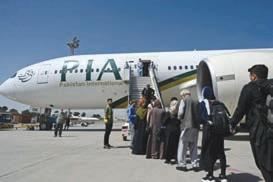 BEIJING Staff RepoRt
BEIJING Staff RepoRt

The first direct flight of Pakistan International Airlines (PIA) from Islamabad arrived in Beijing Sunday, two days before the scheduled arrival of Prime Minister of Pakistan Muhammad Shehbaz Sharif at Beijing on 1 November.
After suspended operation between Beijing and Islamabad since February 10, 2020 due to COVID-19, PIA now officially resumed its operation between the two capital cities.
The first flight PK-854 with 61 passengers on board arrived at Beijing Capital Airport at 14:55 pm local time on Sunday.
A Pakistani passenger Khan Raza told CEN that he is very excited to arrive in Beijing, adding that he has
business in Beijing and a direct flight suits him.
Bashir Ahmed Butt, a leader of All Parties Hurriyat Conference (APHC), said the “fascist” government of Narendra Modi, the prime minister of India, has failed to subdue the people of occupied Kashmir despite the blatant use of brute force and added that “humiliating defeat” in the disputed region is the destiny of “Hindutva” regime. Butt, in a statement issued
from Srinagar city, said the people of Kashmir have rendered unprecedented sacrifices to secure their UN-recognised right to selfdetermination and will never compromise on what he asserted was their cherished objective since the Partition in 1947.
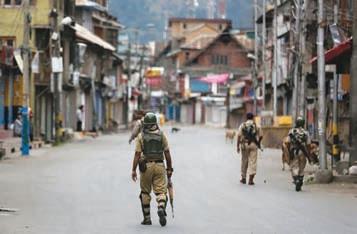
He said that since August 5, 2019 — when the Parliament of India voted in favour of a resolution to revoke the temporary special status, or autonomy — state terrorism has increased manifold
in the occupied region, crippling the economy and making life hell for residents.
“In addition to committing war crimes, the regime in New Delhi, backed by paramilitary Rashtriya Swayamsevak Sangh (RSS) group, is conspiring to implement its devilish Hindutva agenda on Kashmiris through cultural aggression.”
He stated that the lives, honour, identity, culture and land of the people is at stake, and stressed unity among all communities living in the territory to thwart the nefarious designs of New Delhi.
Butt also urged the international community to come forward to save the people of Kashmir from the Hindutva onslaught.
Muhammad Sultan Butt, Azad Kashmir representative of the alliance, also expressed serious concern over the increasing state terrorism in the occupied region. He thanked the people of held Kashmir for observing October 27 — the day India invaded the princely state of Jammu and Kashmir — as Black Day.
my business activities. A direct flight has two major advantages for me. One is short distance, and secondly, low fare”, he added.
Talking to China Economic Net, Abbasi Shahzad said he was studying in Beijing but was stuck due to the COVID-19 pandemic. The direct flight has facilitated him to resume his study right at his university in Beijing.
“I’m very happy today that I safely reached Beijing and the ticket I got is a much-discounted fare as compared to previous months. After quarantine, I will resume my off-line study”, he stated.
It is to be noted that PIA is expanding its flight network for China and having direct flights to Chengdu, Xi’an, and Beijing and it is expected that PIA will start the Lahore-Guangzhou operation in December this year.
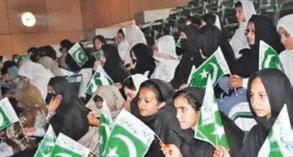 GILGIT app
GILGIT app
The 75th Independence Day of Gilgit Baltistan will be celebrated with great enthusiasm and national fervour today (Tuesday). People will recall the sacrifices of their forefathers and tell the present generation about the invaluable freedom achieved as a result of those sacrifices. The main event will be held in Chinar Bagh Gilgit, which will be graced by President Dr Arif Alvi as chief guest.
On November 1, 1947, the people of Gilgit-Baltistan raised the flag of their freedom against the Kashmiri Maharaja, declaring an independent state and joining Pakistan. In commemoration of this day, there is a grand celebration every year. The grand celebrations will feature various traditional and cultural events along with rallies called out by all the political parties.
Federal Minister for Power Engineer Khurram Dastgir Khan has said that all development projects, put in cold store during the last 4 years, are being revived.
Addressing the inaugural ceremony of 220-KV Lalian grid station, completed with Rs 4 billion, he said on Monday when Pakistan Muslim League-Nawaz (PML-N) came to power in 2013, the country was facing the worst-ever load-shedding of 18 to 20 hours per day.
Similarly, the country was also experiencing terrorism and killings were continuing in Karachi and other parts of the
country.
This situated had discouraged foreign investors, he said, adding that Nawaz Sharif, however, made concerted efforts and he not only overcame shortage of electricity but also restored peace in the country. He also initiated a new chapter in the progress of Pakistan by introducing ChinaPakistan Economic Corridor (CPEC).
He lamented that an anti-development group succeeded in grabbing power and the development process was stopped, which remained suspended for the last four years.
“We will once again restore the same momentum of progress and prosperity which the country experienced during 2013-2018,” he said, adding that Prime
Minister Shehbaz Sharif would also proceed to China on Nov 1 and the government would restart work on different projects under CPEC with a renewed commitment and zeal.
He said that Nawaz Sharif had a vision for progress of Pakistan. He also had mental and physical capacity to undertake these projects. He said that the PML-N government was committed to starting work on all delayed projects. In that connection, work on 775-megawatt Karot hydro electric power project had already been started while work on 1,320MW Shanghai Thar coal project would be initiated very soon. He said that the coalition government’s mission was to put Pakistan on road to
progress and prosperity.
The minister said that National Transmission & Dispatch Company (NTDC) had finalised different projects in all provinces with an estimated cost of Rs1,000 billion. “We will inaugurate some of these projects while work on the remaining projects would also be started during this year,” he promised.
Later, he also went to Jhang Road near Churagh Abad Interchange where he inaugurated another project of 500-KV Painsara grid station, which was completed with an estimated cost of Rs 16.9 billion.
He said that these projects would help overcome problems of low voltage in the area. These projects would also enable Faisalabad Electric Supply Company
(FESCO) to provide new electricity connections without any delay.
Managing Director NTDC Engineer Dr. Rana Abdul Jabbar Khan said the grid station projects would not only strengthen the transmission network of NTDC in the region but also help tackle increasing demand of electricity of domestic, industrial, commercial and agri consumers of Faisalabad, Jhang, Chiniot, Toba Tek Singh, Samundari, Gojra, Jaranwala, Chenab Nagar, Chiniot Industrial, Sargodha, Ludewala, Narwala Road, Thikriwala, Lalian and their peripheral localities.
A large number of area notables and FESCO officers including its Chief Executive Officer (CEO) Engineer Bashir Ahmad were also present.
While addressing the first steering committee meeting of the Pakistan-China Business and Investment Forum (PCBIF), Prime Minister Shehbaz Sharif said Monday that he looked forward to meeting the Chinese leadership for a series of productive and fruitful meetings aimed at boosting business, strategic and people-to-people relations.
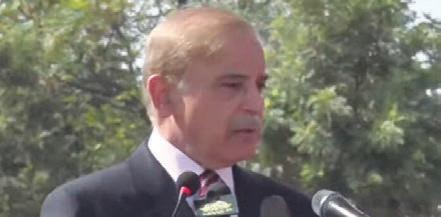
The prime minister stressed the need for emulating the Chinese model of development for the sustainable progress and prosperity of Pakistan.
The prime minister also emphasised creating favourable environment for building a business-to-business relationship between the two countries. “A huge potential exists between the two countries,” he pointed out. He also called for streamlining the business procedures in Pakistan to benefit from China. The prime minister also termed the China-Pakistan Economic Corridor (CPEC) a game-changer for the de-
velopment of Pakistan.
He recalled how the CPEC projects helped Pakistan overcome power outages. The prime minister pointed out that the CPEC projects would increase not only dividends for Pakistan but also its business presence in China. He stressed the need for relocating the labour-intensive Chinese industry in Pakistan by establishing Special Economic Zones. He termed it a win-win scenario for the business houses of both the countries. In the agriculture sector, he suggested learning from the Chinese modern techniques to increase crop yield. He expressed gratitude to China for being one of the largest donors of relief goods for the flood-hit people in Pakistan. He also lauded the efforts of Chinese Ambassador Nong Rong for his immense contribution towards strengthening Pak-China relations.
On the occasion, Federal Minister for Board of Investment (BOI) Chaudhry Salik Hussain said that the BOI was fostering business cooperation between Pakistan and China.
Addressing the first steering committee
meeting of the PCBIF, he said that the BOI had also signed a framework agreement to promote Special Economic Zones and relocate industries in Pakistan.
The federal minister also said that the BOI had drafted a set of joint initiatives for industrial cooperation which would be submitted to the Chinese investors and enterprises during the visit of PM Shehbaz Sharif to China the following day.
Prime Minister Shehbaz Sharif on Monday met Chinese ambassador Nong Rong. Matters relating to the prime minister’s two-day visit to China from Tuesday were discussed. It was agreed in the meeting that the visit of Prime Minister Shehbaz Sharif to China would further strengthen the trade and economic ties. Special Assistant to Prime Minister Tariq Fatemi was also present in the meeting.
KP Chief Minister Mahmood Khan has directed the concerned authorities to work out modalities for declaring the mines and minerals sector as an industry in the province.
The establishment of the sector as an industry will not only help in attracting national and international investors but will also help in the value addition of the minerals found in Khyber Pakhtunkhwa.
The decision has been taken while keeping in view enormous potentials of the mines and minerals sector in the province.
He was presiding over a meeting of the Minerals Investment Facilitation Authority (MIFA) here on Monday. Advisor to CM on Minerals Arif Ahmad Zai, Chief Secretary Dr. Shehzad Bangash, Additional Chief Secretary Shahab Ali Shah, Secretary Minerals Hamayun Khan and other high rank officials attended the meeting. The Chief Minister, who also holds the portfolio of the Mines and Minerals Department, formally approved the granting of 24 mining leases, already approved by the Minerals Titles Committee
(MTC), under Joint Ventures on net profit sharing as per the Khyber Pakhtunkhwa Mines and Minerals Act 2017.
The meeting was informed regarding the enhanced benefits of Joint Ventures under the act, which include greater revenue generation in lieu of fees, greater investor confidence, industrial development and more job creation due to value addition.
The Chief Minister directed to undertake steps to ensure that merit and transparency are upheld, in addition to forming a criterion in the award of leases to ensure that minerals mined in Khyber Pakhtunkhwa receive value addition within the province instead of exporting them elsewhere.
He directed the concerned authorities to work out a mechanism within the next couple of months for the establishment of specific zones aimed at refining minerals to ensure maximum revenue generation.
The Chief Minister also directed to undertake the necessary steps for certification of the minerals within the province which will not only attract investors but will also be helpful in value addition.
He further directed to complete establishment of eco-friendly crushing zones by
Punjab Chief Minister (CM) Chaudhry Pervaiz Elahi on Monday suspended the station head officer (SHO) involved in the alleged torture over journalists in Kamoke before the commencement of the fourth day of PTI long march. Earlier in the day, a police party in the presence of SHO tortured local journalists. The police party exchanged hot words with the journalists during the parking of vehicles in the area. Police during the presence of SHO shattered the camera of the journalist and tortured others who came to rescue. Meanwhile, taking notice of the matter, Punjab CM Chaudhry Pervaiz Elahi has ordered action against the involved policemen in the incident.
the end of the ongoing month, adding that stern action will be taken against the illegal mining and smuggling of minerals.
The forum was briefed in detail about reform initiatives taken during the last four years of the incumbent provincial government and informed that the entire business of the department has been digitized whereas over 21,000 employment opportunities, including engineers, mine managers and 20,000 mine workers have been created so far.
It was further informed that the draft of Khyber Pakhtunkhwa Minerals Policy 2022 has been prepared and mineral auction rules 2022 have also been vetted by the law department. Other major legislative reforms completed by this government include; Coal Mine Rules 2022, Rescue & Training Rules 2022, Metalleferrous Mines Rules 2022, Khyber Pakhtunkhwa Mines & Minerals (Amendment) Act 2019, Khyber Pakhtunkhwa Mines Safety, Inspection and Regulation Act 2019, Khyber Pakhtunkhwa Excise Duty on Minerals (Labour Welfare) Act 2021 and Khyber Pakhtunkhwa Temporary Permit Rules 2020.
Besides over 15,000 inspections have been conducted during the last four years, thousands of FIRs were lodged against illegal mining, over 1000 mines leases suspended temporarily whereas 322 mines were closed permanently due to insufficient safety measures. Similarly, up-gradation of the Mineral Testing Lab and Mining Cadastral Phase-II project are in progress.
Briefing about the initiatives taken for the welfare of labour involved in mining, it was informed that Rs. 130 million has been disbursed as scholarships amongst the children of laborers. Rs. 43 million distributed amongst permanently disabled workers whereas Rs. 22 million has been allocated for workers having occupational pulmonary diseases.
Besides, Rs. 8.7 million has been provided for workers suffering from pulmonary diseases whereas Rs. 12.50 million has been allocated for skill development programmes for laborers’ children.
It was also told in the meeting that the department has cancelled 50 idle mineral titles, including 13 cement factories in the province.
Light rain-wind/thunderstorm with light snowfall over mountains is expected at isolated places in Gilgit Baltistan, upper Khyber Pakhtunkhwa, Kashmir, Islamabad and Potohar region, according to the Pakistan Meteorological Department (PMD). Mainly dry weather is expected in most plain areas of the country, said PMD. It further noted that according to the synoptic situation, continental air was prevailing over most parts of the country, while a westerly wave was present over the upper parts of the country. During the last 24, the weather remained dry in most parts of the country, while cold in northern areas. However, rainthunderstorm occurred at isolated places in upper Khyber Pakhtunkhwa and GilgitBaltistan. The rainfall recorded during the period was Khyber Pakhtunkhwa: Saidu Sharif 11mm, Kalam 08, Dir 03, Malamjabba 02, Pattan 01; Gilgit-Baltistan: Gupis 01mm. The lowest minimum temperatures recorded were Leh -04 °C, Skardu and Kalam 01 °C

Prime Minister Shehbaz Sharif has said Pakistan wants to expand trade and investment ties with China ahead of his first official visit to the neighbouring country. In an op-ed published in the Chinese newspaper Global Times, the premier described the ties between the two countries using the words “longevity, love and trust”. “There is no relationship like ours which so deeply touches the soul of our people and evokes such strong emotions. Poetic expressions with emotive diction are used to captivate the essence of these fabulous ties. “Touching stories of mutual support and solidarity in difficult times, transferred from generation to generation, have become an ineffaceable element of our collective consciousness,” he added. He also explained that “the seed of Pakistan-China friendship has blossomed into an evergreen tree with deep roots and strong branches. It has withstood the vicissitudes of international upheavals and vagaries of domestic changes.” For Pakistan, relations with China form the cornerstone of our foreign policy, he said. Talking about the geopolitics landscape, he said that the international landscape had undergone a profound transformation that was unprecedented in its scale and scope. “Geopolitical tensions are leading to conflicts, the resurrection of ideological divide, economic and technological decoupling, and a costly arms race.
SHANGHAI Staff RepoRtAn Online National Pavilion featured Pakistan’s trade exchanges, investment environment, characteristic industries, and tourism was launched for the upcoming 5th China International Import Expo (CIIE), China Economic Net (CEN) reported on Monday.
As per Trade Development Authority of Pakistan (TDAP), the cloud pavilion showcased Pakistan as an
emerging market of thriving opportunity. “We are looking forward to the participation in different trade fairs, especially the upcoming CIIE to be held in Shanghai this November,” noted Moin ul Haque, Pakistani Ambassador to China, while taking an exclusive interview with China Economic Net.
Scheduled from November 5 to 10, the 5th CIIE provides a platform for companies from around the world to display their products, promote their brands, and find more business
partners in the world’s second-largest economy. The Expo launched its cloud series recently, which consists of the online national exhibition and the Digital CIIE platform.
A total of 30 countries have taken part in the online country exhibition which is now in trial operation, said Sun Chenghai, deputy director-general of China International Import Expo Bureau, adding that the platform is set to offer a visiting experience comparable to that of an offline exhibition.
Pakistan enjoys a large pool of workforce of more than 60 million, and a growing consumer tele-density of more than 150 million, noted source from TDAP.
Also Pakistan is one of the major contributors to the global market when it comes to agriculture, textile, footwear, pharmaceutical, sport goods, packaging, iron & steel.
“Using this platform, we are working together to expand our trade with China and with the world,” the Ambassador pinpointed.
The third one-day “Agriculture and Food Sciences Innovation Event” was organized in MNS Agricultural University Multan with the support of Dise. The event was inaugurated and presided over by Minister for Agriculture, Punjab Syed Hussain Jahania Gardezi.
Speaking on the occasion, Minister Agriculture said that innovation in agriculture and food sciences is the need of the hour to ensure food security through healthy and hygienic food. He further said that universities are engines of research. Such activities are indispensable for students to develop new and innovative ways of doing business,he maintained.
Vice-Chancellor MNS University, Multan Prof. Dr. Asif Ali said that the Univer-
sity of Agriculture has provided a conducive environment for the development of entrepreneurial skills among the students so that the students can be equipped with the required skills.
By which the business related to agriculture and food can be promoted. Secretary Agriculture South Punjab Dr. Faisal Zahoor said that Government is trying to ensure food security in the country through coordinated efforts. He further said that the Department of Agriculture is striving hard to create awareness among farmers as well as provide relevant technology to deal with the issue of climate change.
DG Agriculture Punjab Dr. Anjum Butar said that the agriculture department will achieve its target of wheat cultivation.
DG Research Punjab Nawaz Khan Makan said that the Agriculture Research Wing is work-

ing to develop new varieties of crops which is very important for the development of agriculture.
CEO DISE Dr Khurshid Qureshi said that meeting the nutritional needs of climate change and growing population is a big challenge.
Students and faculty members of more than 30 universities presented more than 90 innovative business ideas in these competitions. More than 20 stalls of various industries and businesses were set up in the dais.
In this event, Vice Chancellor Bahauddin Zakaria University Professor Dr. Mansoor Akbar Kundi and other faculty and staff students and a large number of families visited the stalls. The best business ideas were awarded with prize money so that they could further expand their business for the betterment of the people.
RiME MiniSTER Shehbaz Sharif claims he was approached by a mutual acquaintance with a message from PTi chief imran Khan, that a consensus be evolved over the appointment of the next COaS. PTi chief has firmly denied making such an approach, during his Long March speech on Sunday saying that the Prime Minister was a mere ‘boot polisher’ and it was not worth talking with him. Mr Khan said that he was still talking to those whose boots hew polished, and he would not talk to someone who could not deliver anything. Mr Sharif said that there was no question of consulting Mr Khan on the COaS’s appointment, as it was purely aT the discretion of the Prime Minister.
Mr Khan also said that his party had not requested anyone in the military establishment to help it come to power. Once again, he seemed to be trying to explain to his audience that he was consistent in his opposition to the military, and that the PdM parties had curried favour with the military to oust him through a vote of noconfidence. He seemed to carry some resentment against the dG iSi for his pre-Long March press conference, in which he had said that imran had offered the COaS a lifetime extension at the time of the vote of noconfidence. Mr Khan has not had his expected success in galvanizing the public, as the turnout at the rallies he is holding en route is less than has been promised. it cannot be said that his popularity has waned, for in the Kurram by-election, he won handily, even though he had not been present in the constituency because of Long March matters requiring his presence in Lahore.
That victory probably adds both zest and urgency to the Long March, but not because it would force early elections. The assemblies are probably past the point where there would be an early dissolution, as the constitutionally mandated election is now less than a year away. However, the Long March provides an opportunity for Mr Khan to carry his message to the Punjab heartland across the GT Road, which would be helpful in an election year. So far, the Long March has also been peaceful, but it has not been free of casualties. a telejournalist has been crushed by falling off the container, a policeman has died of a heart attack. There is all the more need to ensure that the Long March stays peaceful, not just at its terminus, but as it winds its way across the country.
necessarily, as we were to discover, because the ‘senior’ merely wanted to know the batch the group of students belonged to (for the benefit of another newcomer), a query the victim had misunderstood to be the prelude to a ragging session. This had prompted him to panic and react rather ill-advisedly.
as it turned out, the poor guy was from a different section so i never got to know him well. He was an unusually innocent boy; for a full year later, amid rumours that our first annual exams were going to be boycotted, he had brought his mother along, presumably to stop the disruptive elements dead in their tracks. i wonder where he is now, and whether he has retained that innocence.
Ragging was rampant, especially during the first couple of weeks –in classes, buses, campus grounds and hostels. There was not much one could do when the gang descended.
of the buses were occupied and buzzing with activity while their interiors were completely devoid of passengers.
in our inaugural week on the campus, an instructor (let us refer to him as aK) reassured us that it would be next to impossible for us to fail his subject. He explained that availing of the ‘route’ facility two or three times a week probably would not suffice, and that one would need to visit anarkali or ‘Fortress’ every day of the week without fail to stand a chance to flunk his subject. Many students took these glad tidings to heart; while some decided to accept the challenge. One individual (i think his given name was Faisal) took it so seriously that he was forever afterwards referred to as the ‘Router’. i wonder what he is up to these days.
1
IT was the back steps of the ‘old Mechanical’ block in UET Lahore where the Bhatti Group came into being, quite inadvertently, almost thirty years ago. On the very first day of the 93-session, five mechanical engineering freshmen found themselves sitting on those steps, not knowing what to do during the break between classes. i happened to be one of them. We seemed to have little in common, barring from the fact that we all belonged to the top fifth of Mech-d in terms of merit. Little did any of us know that the association formed that day was destined to last till graduation and beyond. The group was named after the oldest member, although it is not known who first referred to the group that way and when. although no other member belonged to the Bhatti clan, nobody – Javed, Zafar, Tahir or i – in the slightest degree objected to being elevated to the status of honorary Bhatti. That day, many other freshmen were around too, each looking to find his footing in the unfamiliar environment. The first nicknames were dispensed on that day, some of which stuck. i had alluded to an individual with a peculiar hairdo as ‘Puff’, and that is how he was always referred to thereafter. We later found out that his parents had lovingly named him imran. There was Sajjad, a live-wire if ever there was one, who immediately distinguished himself on account of using choice Punjabi swearwords in every sentence he uttered. i suggested an appropriate, albeit unpublishable, sobriquet for him too, which became extremely popular. (it would be years before somebody pointed in my general direction and told him about the origin of his nickname. To my relief, he displayed no signs of anger or resentment, merely letting go of a long stream of expletives as only he could.)
The UET memories are getting fonder by the year. it had not been the most auspicious of starts though: a freshman had been manhandled by a senior student in full view of terrified newcomers before they had attended their inaugural class. Totally un-
Some managed to get off relatively lightly, but it was purely a matter of luck. On different occasions, i remember being ordered by the gang to propose to an imaginary girl, kiss a tree, and imitate Malcolm Marshall’s bowling action – homoeopathic stuff, really. That i was a day scholar had helped matters.
But some of my mates, who were boarders, had had a hard time, and were firmly resolved to take it out on subsequent years’ freshmen. in our second year, i remember being urgently summoned by a classmate to his hostel room to witness what was described as ‘a quite spectacular scene’. i had been duly warned but nothing could have prepared me for the spectacle in store for me. For what did i see upon entering his dorm but a safety-helmet wearing freshman in the cock (murgha) position, perched precariously atop a mansized cupboard! How he was crooning a Vital Signs number in that condition, i will never know.
When it was my turn to put my handiwork to test, there was an almighty explosion. We all found it rather amusing but the shop supervisor was none too pleased. It was probably a sign from Providence that I was not cut out for manual work, and that my talents lay on the intellectual front instead. At any rate that was what I inferred. Events of the intervening years have since validated this judgment many times over
it was a time-honoured UET tradition that at least seven advisors or coadjutors accompanied an individual if he had to buy as much as a belt or a pair of socks. The UET transport department was considerate enough to conduct ‘routes’ to anarkali and the Fortress Stadium every evening for the benefit of inlivers and those out-livers who chose to stay back late. a hallmark of these ‘routes’ was that the roofs

strategic designs endanger regional peace and stability. india’s hegemonic designs impede all efforts to achieve regional economic and social growth, plunging the region into a serious security crisis. Besides, its aggressive attitude towards the smaller states of South asia hampers all the efforts for greater regional integration thereby regional organizations, particularly the South asian association for Regional Cooperation (SaaRC), remain highly unsuccessful.
India continues to portray itself as the largest democracy in the world while violating all the norms of democracy with impunity. Motivated by fascism, the Rashtriya Swayamsevak Sangh (RSS) widely follows and propagates the ideology of ‘Hindutva’. india’s ambitions to become a great power have had a significant impact on regional peace and economic development. india’s continued atrocities in Jammu and Kashmir and its war-mongering policies are hindering regional peace and integrity.
Regional peace has continued to be affected by india’s refusal to let the Un have a decisive role in resolving the issue of Jammu and Kashmir. india not only has a history of provocation with Pakistan, but its aggressive
all over the world, regional cooperation has resulted in development, peace, and harmony. The north american Free Trade agreement (naFTa), the association of Southeast asian nations (aSEan), and the EU are good examples of a high level of regional cooperation. These regions have witnessed a rapid growth in their economies and living standards. in comparison, South asia has very low levels of regional cooperation. The regional organization, SaaRC, has remained highly unsuccessful in realizing development and welfare objectives.
SaaRC has entered the FOURTH dECadE of its existence, however it is still far away from accomplishing its ideal objectives. To look at various aspects of South asia and SaaRC, both are unique. South asia is diverse politically, culturally, religiously, and ideologically. The complications arise when one understands the variation in scope, influence, and level of economic expansion between the nations. in addition, indian hegemonic designs create multiple instabilities and insecurities. as noted, india regards South asia as its
backyard. india’s unmistakable position is one of the obstacles to the method of South asian territorial reconciliation. For security reasons, small regional countries are lobbying for external connections with western nations and China because of their terror of indian power (the perceived regional hegemon) attached to their unsettled quarrels with new delhi. indian hegemonic ambitions coupled with increasing defense capabilities are giving rise to worries in its bordering countries which are already concerned about the indian strategic policies and her abnormal involvement in the internal affairs of the neighbouring countries.
States’ foreign policy in international relations serves as ambassadors for their core national interests, whereas nothing else has any lasting value. However, national interests may well be slightly changed, though not completely surrendered, for the advantage of regional gains. Regionalism will not provide results unless members accept to share national sovereignty and choices, which are still necessary for the SaaRC to succeed. The attitude and evaluation of regional conduct of SaaRC members exhibit nationalistic inclinations. Ever since the
a particularly harrowing ordeal, starting from the very first week at the university, manifested in the form of the Workshop Technology class. it involved a great deal of drudgery on the part of unsuspecting students, which bordered on forced-labour in case of the Foundry and the Machining Shop. There were five shops in all, which the student-batches attended in parallel. due to the proximity of their roll numbers, the Bhatti Group members always operated in the same shop. in the Electrical Shop, one of the tasks was performing the ‘staircase’ wiring. One by one, my fellows successfully tested their circuits by alternately toggling the two switches.
When it was my turn to put my handiwork to test, there was an almighty explosion. We all found it rather amusing but the shop supervisor was none too pleased. it was probably a sign from Providence that i was not cut out for manual work, and that my talents lay on the intellectual front instead. at any rate that was what i inferred. Events of the intervening years have since validated this judgment many times over.
The author is a connoisseur of music, literature, and food (but not drinks). He can be reached at www.facebook.com/hasanaftabsaeed
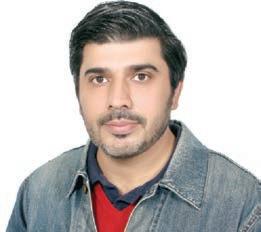
World Wars, Europe’s extremely patriotic nations began to think about collaboration, which was successful and talk is now heard more frequently about the EU than about Germany, France, or Britain. There are intra-regional disputes in every region, and the aSEan region also has unsolved bilateral problems.
all these developments have taken over the routine job of the SaaRC. That is to say, the Eleventh SaaRC Summit was delayed for three years, because of the Kargil episode. The summit was postponed due to the aloof behaviour of india. in 2001, once again india, like a spoiled brat, faced tense affairs with Bangladesh also on their border, and both countries used force. The usual dominant behaviour of india has also twice swallowed up the SaaRC Summits in 1992 and 2005. Likewise, the 1989 SaaRC Summit had met a similar destiny due to the Sri Lankan charge over indian obstruction in her interior undertakings. india has long been involved in regional terrorism in regional countries. it has been engaged in creating trouble in Balochistan, sponsoring different terrorist groups, including the Balochistan Liberation army (BLa). india is trying to give rise to uncertainty in
the province and damage the national unity of Pakistan. Similarly, india embraced the Tamil rebellion in Sri Lanka, the Chakma revolt in Bangladesh, and the Maoist insurgency in nepal, employing terrorism in her foreign policy for the sake of advancement in South asia. Previously, new delhi also recorded open intervention in the 1971 disintegration of Pakistan by fostering Mukti Bahini in East Pakistan. Furthermore, india is also involved in maritime terrorism in the region, violating various international laws of the seas. in 1960, india and Pakistan signed the indus Water Treaty (iWT) to resolve their joint concerns over the distribution of water in the indus Basin. However, india again habitually started intervention and built water basins on three specific western rivers that were in Pakistan’s authority under the iWT which is a clear violation of the treaty. Besides, india is engaged in afghanistan for the construction of dams on rivers that are flowing into Pakistan. in addition, Kathmandu observed great anxious affairs with new delhi on sharing common rivers, the conflict mainly was on the delivery of gains over and done with the creation of water projects in nepal by india.
South asia’s political history and security environment have led to it being the least integrated region in the world. india has continued to hamper regional growth and economic development. Threats to regional integration have intensified since the Modiled Hindu national government came to power. despite the SaaRC’s establishment, several gaps remain in forging closer intraregional economic ties. it is high time that the regional countries raise their voices at the global platformagainst india’s negative strategic designs and work closely for the greater regional goals.
Khushal Khan is working as Assistant Research Fellow at BTTN, Quetta.
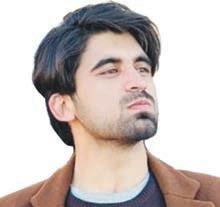
Shehbaz claims to have rejected Imran’s approach; Imran denies making it
South Asia’s political history and security environment have led to it being the least integrated region in the world. India has continued to hamper regional growth and economic development.HASAN
Yousaf Nizami Editor
Arif Nizami (Late)
A. Niazi
Aziz
Ahmad
lations, manpower, employment and consular, private aviation, tourism and cultural, investment, abu dhabi development Fund, electricity, energy and mineral resources, information and communication technology sector, education, science and technology sector, marine environment, as well as Cooperation in development, agriculture, healthcare and health education sectors and humanitarian and charitable assistance.
Saudi arabia has already expressed its positive attitude towards increasing cooperation with Bangladesh. Bangladesh and Saudi arabia has signed several agreements to increase bilateral trade and investment. in addition, bilateral trade and economic cooperation with Saudi arabia will be increased with the UaE, Qatar, Bahrain, Oman, iraq, Kuwait, Lebanon, Egypt and Turkey.
The company pledged investing $16585 billion in seven projects during the international investment Conference in dhaka last november. itis one of the companies that have shown interest in the construction of dhaka East-West Elevated Expressway. Some Saudi investments are already in the pipeline. These include the development of Patenga Container Terminal with Red Sea Gateway Terminal in Public Private Partnership. Further Saudi investment will largely depend on how successfully the projects in the pipeline can be managed.
aCWa Power, an internationally renowned energy company, has expressed interest in investing around $600 million to build a 730 MW combined cycle power plant in Chittagong. al-Fanar plans to invest $100 million to build a 100 MW iPP solar project in a joint venture. al-Bawani is interested in investing about $10 million in the employment of skilled human resources for construction and engineering projects.

BREaST cancer is the most commonly diagnosed cancer and the leading cause of cancer deaths globally. Pakistan has the highest rate of breast cancer among asian countries as one in every nine women have a lifetime risk of being diagnosed with breast cancer. Therefore, women in the country must be aware that the key to fighting this disease is early diagnosis.
The situation also indicates that women are deficient in knowledge about breast cancer and believe many prevalent superstitions and spiritual statements about the disease. in order to address the urgency of the matter, Pakistan desperately needs to initiate multi-pronged strategies — including better reporting and documentation of cases, community-level awareness, promoting early detection, overcoming barriers in the provision of better health facilities, and making diagnosis easier. it must be noted however that due to a low health budget and lack of funds, there is a scarcity of modern cancer care infrastructure.
To overcome this issue, officials must set up a national-level cancer registry database that can provide accurate prevalence of diagnosed cases, survival rates, and other related parameters. The government must also invest in cost-effective early breast cancer detection strategies to promote down staging and ensure the availability of facilities for breast cancer patients.
RANIA KHAN ISLAMABAD
THE ever-increasing population coupled with poor governance has strengthened mafias and provided them with a breeding ground to exploit the majority. The high and mighty who had been evading taxes and multiplying their wealth at the expense of have-not’s taxes are minting money. The transport mafia has continuously raised fares weekly on the pretext of rising oil prices or longer routes due to inundation. They have refused to cut fares even after the drop in oil prices.
Similarly, retailers have constantly raised the prices of essential items arbitrarily. The floods provided them with another excuse to create shortages and almost double the prices of medicines and food items. Even though now most routes have been cleared and supply chains have been restored, the retailers and traders have refused to reduce prices.
WiTH the aim of increasing bilateral trade and mutual economic cooperation, special attention must be paid to the ‘Middle East’. Bangladesh seeks cooperation in at least 12 sectors from the top ten countries of the arab world or the Middle East to overcome the ongoing power and energy crisis, the impact of the Russia-Ukraine war and the financial loss of the covid-19 epidemic. One of these is the power and energy sector.
Maximum emphasis has been placed on easy terms of investment and energy imports from the Middle East in this sector. in addition to this, the government is interested in new manpower exports to collect remittances, one of the sources of foreign exchange as well as product exports. a meeting of Bangladesh-Saudi arabia Joint Commission (JC) has been called in Riyadh, by the end of this month.
Looking ahead to that meeting, Saudi arabia wants to know what kind of cooperation Bangladesh wants to increase bilateral trade. The Economic Relations department will present an outline of economic cooperation and investment at the meeting itself.
it is known that assistance will be sought from the Middle East to resolve the ongoing power and energy crisis. its biggest impact is noticeable in inflation. also, the majority of remittances come from Middle Eastern countries. due to this, the stakeholders have urged increasing mutual economic cooperation and bilateral trade with the Middle East. More than 80 percent of Bangladesh’s fuel oil is imported from the Middle East, including Saudi arabia.
Similarly, most remittances come from exporting unskilled manpower to Middle Eastern countries. Most of the fertilisers used in agricultural production are imported from the Middle East. But inflation is increasing pressure on Bangladesh The dollar crisis and the fuel price increases are making it difficult to maintain continuity of production. initiatives have been taken to increase mutual cooperation with Middle East countries to overcome the current situation. Bangladesh is dreaming of developing economic relations with the Middle East.
Bangladesh will be represented the JC meeting by the Economic Relations department of the Finance Ministry. Before attending the meeting, ERd held several inter-ministerial meetings. in these meetings, economic relations with the whole Middle East, including Saudi arabia, were urged strengthened and bilateral trade increased. Besides, cooperation in 12 sectors will be sought from the Middle East. These include development of bilateral economic and trade re-
The Commercial Counsellors in Bangladesh Embassies in their countries have already written letters about increasing bilateral trade and manpower export. Besides, the government has taken a special initiative from the ERd. an outline of this will also be presented to Saudi arabia.
Saudi arabia has already been informed about ensuring one-stop service. ERd believes that if mutual economic cooperation with Saudi arabia, the top country of the arab world, increases, bilateral trade with other Middle Eastern countries will also increase.
and for this reason, preparations are being made vigorously before the meeting. Finance Minister aHM Mustafa Kamal said that currently there is an excellent environment for investment in Bangladesh. There is considerable potential for investment on Public-Private Partnership (PPP) basis, particularly in major infrastructure, information technology, communication, agriculture, power and energy, medical sectors.
Middle Eastern entrepreneurs including Saudi arabia can take investment opportunities in those sectors if they wish. Middle Eastern countries can take huge manpower from Bangladesh if they want. He said that the country’s electricity and energy sector needs investment and cooperation from the Middle East, including Saudi arabia.
according to Bangladesh Petroleum Corporation data, the country consumes 6.5 million tons of fuel oil annually. Of that, 4 million tons of diesel is imported annually. More than 90 percent of vehicles in the transport sector in the country, and 34 percent of the power generation, are dependent on fuel oil.
For this, Bangladesh depends on Saudi arabia and the Middle East. Bangladesh imports refined and crude fuel oil.
apart from this, BPC also buys fuel oil through open tender. in other words, more than 80 percent of fuel oil is imported from Middle Eastern countries, including Saudi arabia. Earlier in 2019, two agreements and four memorandums of understanding were signed with Saudi arabia for the development of various sectors of Bangladesh, including the power and industrial sectors, the PM’s presence.
if these agreements are implemented, the country’s bilateral trade and investment with Bangladesh will increase. Both countries will benefit economically. Especially the ongoing crisis in the power and energy sector of the country will be removed. Besides, bilateral trade with Saudi arabia also has great opportunities and possibilities.
in addition, Saudi arabia’s state-owned oil company aramco has already shown interest in building, operating and maintaining an oil refinery, costing $1.5-2 billion. Saudi firm Engineering dimension LLC is very enthusiastic about investing in Bangladesh.
Preparations for the 14th meeting of the Bangladesh-Saudi arabia Joint Commission have started in full swing. The Economic Relations department (ERd) of the Ministry of Finance prepared the working paper on behalf of Bangladesh. in the meeting in Riyadh, the cooperation of Saudi arabia will be sought in the export of electricity, manpower, increasing the export of manufactured goods, export of halal products, especially fish and meat, export of agricultural processed products and fertilizer production.
Besides, Bangladesh has the opportunity to export clothes to other Middle East countries including Saudi arabia. The entrepreneurs of the country’s garment sector have expressed their interest in this regard. Saudi arabia will be requested to speedily implement the agreements made with Saudi arabia at various times.
Bangladesh has several bilateral trade investment agreements with Saudi arabia. These agreements must be implemented now. it is reported that talks are going on between Petrobangla and aramco regarding a liquefied natural gas (LnG) deal. This will solve the country’s LnG crisis. Besides, Eastern Refinery Unit-2 has sought Saudi arabia’s cooperation in processing three million tons of crude palm oil per day.
if it is implemented, 68,000 barrels of refined petroleum will be available. MoU will be signed between Bangladesh Power development Board and world renowned aCWO Power. it is expected to make great progress in the renewable energy sector in the country. it has an agreement with Saudi arabia to build a 100 MW Solar independent Power Plant (iPP) and manufacture transformers and electrical components.
These agreements need to be implemented quickly. Meanwhile, 20 more Saudi arabian companies have shown interest in investing in Bangladesh, said Foreign Minister dr. aK abdul Momen recently. after a recent meeting with a delegation of Saudi arabia, he added, “We will give them all the facilities they need.” Both countries have much more to do in terms of trade and investment cooperation.
Besides, Bangladesh is also interested in investment on the basis of public-private partnership or PPP. Saudi arabia will mainly invest in Bangladesh’s infrastructure, medical, tourism and other sectors. a memorandum of understanding has been signed with Saudi arabia. Salman F Rahman, adviser to the Prime Minister on Private industry and investment on behalf of Bangladesh, signed one such MoU a few months ago. However, countries of the Middle east especially Saudi arabia’s investment in the power and energy sector is urgently needed at the moment.
The writer is a
columnist
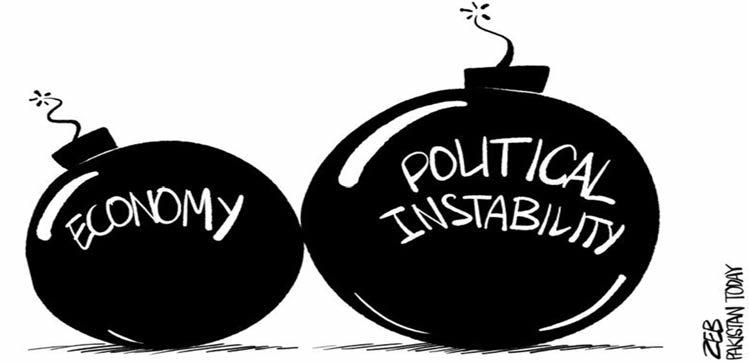
The provincial government has failed to regulate the practices of traders and transporters offering them further leeway to continue exploiting the public. Both the government and opposition continue shifting the blame on one another for the worsening economic situation. neither of them will ever assume responsibility and work on addressing the public’s problems. The rising population will further multiply the problems. This along with emerging climate disasters will ultimately take the country to the brink of a catastrophe. The ruling elite and the mafias should realise that they will also suffer if the country descends into a serious crisis. Therefore, they must change their practices and work for the betterment of the country.
GULSHER PANHWER JOHITHE youth of Balochistan have little access to any form of recreational activities such as sports. This is extremely discouraging for those who want to participate in sports and often pushes youngsters into unfavourable activities. across the province, teenagers can be seen playing cricket and football in the streets, but they are seldom given any opportunities to showcase their talents. Most educational institutes do not provide any facilities or arrange tournaments in which students can participate. although many national tournaments are held for cricket, football, tennis, etc, coaches and team management rarely recruit players from the province. no training or coaching camps are set up anywhere in the province because of which players lack proper training, diet, and game sense. Therefore, even those who can travel to other parts of the country for trials are hardly selected. a large proportion of the youth regularly participates in football tournaments organised by private companies. However, these tournaments are not enough for players brimming with passion and talent.
now that FiFa has lifted its ban on Pakistan Football Federation, the federation must arrange tournaments in the province and provide players with proper coaching facilities. Similarly, Pakistan Cricket Board must acknowledge the talent in Balochistan and recruit players and prepare them for local and international tournaments. Educational institutes should also encourage students to engage in recreational activities and arrange competitions to motivate students.
JOSH BALOCH KECHWE live in an ever-evolving world that demands more than good grades and stresses the importance of developing valuable life skills. The traditional education system has trained students to evaluate their knowledge and skills in terms of marks and grades. However, introducing skill-based learning at an early age prepares children for the real world beyond test scores.
Many students lack the essential attributes of a skilled professional, which include critical and creative thinking, curiosity, self-analysis, and undertaking initiative. Low self-esteem or poor confidence leaves students doubting their ability to succeed. They also feel hesitant about engaging in learning. Teachers should engage students in conversations about their interests and highlight their skills. developing skills during school education can help students figure out their strengths and weaknesses. instead of focusing solely on passing exams and scoring high marks in the short run, they will learn with a clear objective.
Education and skill development are both essential to prepare students for the pressures and demands of today’s challenging world. Skill development as a part of school education is important to establish a strong foundation for a prosperous future. Skill-based learning helps students develop problem-solving strategies, critical thinking capabilities, and effective communication techniques. a well-defined school education system will help improve the future generation’s living standards and the country’s growth prospects.
TOOBA EMAN KARACHI
tHe Workers’ party (pt) supporters were out in force last night in the centre of são paulo, pretty much as they were 20 years ago when Luiz inácio Lula da silva first won the Brazilian presidency. then, as now, convoys of celebrating Lula-supporting petista drivers honked their horns, with their chanting, flagwaving passengers precariously hanging out of car windows.
that win – which followed three unsuccessful runs – was sweet. this victory –Lula’s third – is perhaps even more gratifying because the former trade union leader has come back from imprisonment, defied his political enemies and condemned his nemesis, Jair Bolsonaro, to defeat. And last night there was an element of relief in the joyous mood because, for the moment at least, the incumbent rightwing populist’s dark threats to overturn the result had failed to materialise.
But the country that Lula da silva will lead will be very different from what it was when he took office at the beginning of 2003. Yesterday’s election shows just how divided the country has become. over the past year and a half, opinion polls have consistently underestimated the support that Bolsonaro enjoys, suggesting that many
conservatives either refuse to take part in polling or are shy about their beliefs. Ahead of the first round, polls suggested Bolsonaro would win no more than 37% of the vote: he won 43%. in advance of sunday’s vote most polls predicted that Lula would win by between four and six percentage points, but in the actual ballot, Bolsonaro narrowed the gap to 1.8 points.
Moreover, Bolsonaro won in 14 of Brazil’s 27 states, dominating in a swath of territory that stretches from the Atlantic coast to the savannah lands of the centrewest. in the wealthier and more developed states, Bolsonaro won by handsome majorities. Fernando Haddad, the defeated presidential candidate four years ago and a key member of Lula’s campaign team, was celebrating alongside Lula on the team’s victory bus last night. But he was defeated decisively by Bolsonaro’s candidate – tarcísio de Freitas, a former soldier and army engineer – in the race to become governor of são paulo state, Brazil’s most populous region. Bolsonaro triumphed spectacularly, too, in the prosperous farming belt of the centre-west.
Lula scraped a victory in the bellwether state of Minas Gerais, but owed his national success to the landslide achieved in the 10 relatively poor north-eastern states. polls showed that those living on incomes of less than $400 a month were more likely to vote for Lula, and that anyone better off than that tended to favour Bolsonaro; 70% of people in Bahia – the state with the highest black population – voted for Lula. evangelical Christians – who now number about a third of the population, perhaps double the number when Lula first took office – also tend to be big Bolsonaro fans.
it is the strength of this conservative bloc that helps explain why the right performed so well in the first round. Back in 2018, the right made gains at the expense of the middle-of-the-road social democratic parties that in one way or another have played an important role in government since the end of military rule in 1985. the
shake-up amounted to something of a political earthquake. the remarkable thing about this year’s election is that the right bettered that performance.
the most eye-catching development has been the election to congressional seats of some of the most controversial figures in Bolsonaro’s administration. eduardo pazuello, for instance, the army general who as health minister was sacked ignominiously after presiding over the disastrous management of the Covid pandemic, won a seat in the house.
overall, rightwing parties increased their representation in the lower house from 240 to 249 deputies, just under half the total of 513. Lula’s pt and its allies have only 141, so the president-elect will need to reach out to the centre if he is to govern effectively.
that means that he will probably need to strike deals with exactly the same political leaders – the notorious self-serving conservative politicians of the Centrão (“big centre”) – who have been allied with Bolsonaro over the past two and half years. this will complicate hugely the task of managing the economy and bringing a swelling fiscal deficit (expected to reach about 8% of GDp in 2023) under control. over the past few months Bolsonaro has thrown money at voters, handing out subsidies and social benefits with abandon. progovernment congressional leaders have channelled vast sums towards the pet projects of loyalist legislators.
the congressional balance could even hinder progress in areas such as the environment, where Lula could make gains simply by revitalising state agencies that have been neglected and underfunded by Bolsonaro. Between 2004 and 2012, pt-led governments won international plaudits for their success in reducing deforestation in the Amazon rainforest. Agencies such as the Brazilian institute of environment and renewable natural resources played a big part in that. But the president-elect will need to secure congressional agreement if he is to get its programmes back on track. the Centrão leaders will be sure to exact a heavy price for their support.
Lula will take over a deeply divided and troubled country. to succeed he is going to need all his famed skills as a negotiator.
Richard Lapper is author of Beef, Bible and Bullets: Brazil in the Age of Bolsonaro.
Opposition leader Benjamin netanyahu decided to end his election campaign in the town of or Yehuda, a midsized city near tel Aviv, where he traditionally enjoys enormous popularity. However, in the last election in March 2021 some of his supporters there didn’t bother voting. they were already worn-out. over the past few weeks, netanyahu held similar campaign events in dozens of bastions of support for him and his Likud party. similarly, to or Yehuda, in these places as well voting rates have dropped in the most recent election round. Looking back, this was one of the major factors that led to netanyahu’s defeat. in his meetings this time around, netanyahu has been trying to reach out personally to those Likud supporters who had not voted. He even visited people at home, sometimes two or three Likud-supporting families in one evening.
At the same time, he also increased his media appearances. What was different this time was that he only gave interviews to right-wing outlets that supported him. He made a show of avoiding the studios of the big networks, even though he would have much more exposure there. Here, too, his goal was to focus on the more apathetic Likud voters.
According to the last polls authorized before election day, on oct. 28, netanyahu is very close to achieving his goal. the av-
erage results of all the polls give netanyahu 60 seats, and a few extra votes, but still not the 61 he needs to get a Knesset majority. in other words, for the moment, the country is facing yet another stalemate.
As usual, netanyahu is doing a good job playing with the hand he was dealt. He embraced ultranationalist itamar BenGvir, who happens to be the rising star in this election campaign. this morning, netanayhu told the army radio station he “is not against” nominating Ben-Gvir public security minister in a future government, and that he himself has zealously maintained his alliance with the ultra-orthodox. in a sense, he sees himself as the ultimate leader of all the right-wing and ultra-orthodox parties.
on oct. 29, netanyahu set out to Bnei Brak, the largest ultra-orthodox city in israel, to encourage the people there to vote. He did not call on them to vote for the Likud, but encouraged them to vote for the ultra-orthodox parties, so as not to — allegedly — abandon the country to the left.
netanyahu is admired by the ultra-orthodox community. He has an inordinate amount of influence there, especially among the youth. in fact, he is more popular than ultra-orthodox politicians. His decision to visit the heart of that community should encourage indifferent voters there to go to the polls as well.
in all the recent election campaigns, people said it would be netanyahu’s last battle, and that because of his trial, he is really fighting for his freedom. the situation has proved that even though he did not manage to put together a government, he has never stepped off stage. no one in the Likud dared to challenge him as their leader. in a rather supportive interview with the right-wing Channel 14 oct. 30, netanyahu was asked how he is doing. He answered that he was “very worried,” because of the deadlock in the polls. the image he used was borrowed from soccer: “We are very close to victory, but we still have to get the goal in the net.” He told his listeners that they are missing just one seat, and called on them to vote for the Likud.
NeArLY 80 per cent of the estimated 70 million people around the world who fell into extreme poverty at the onset of CoViD-19 in 2020 were from india, a recent World Bank report has revealed. But even this shocking figure could be an underestimate, as the lack of official data makes it difficult to assess the pandemic’s human costs.
What accounts for this alarming rise in indian poverty? CoViD-19 was undoubtedly india’s worst health calamity in at least a century. But the pandemic’s economic and social consequences go beyond the direct effects on health and mortality. As i argue in my recent book, the Making of a Catastrophe: the Disastrous economic Fallout of the CoViD-19 pandemic in india, very significant policy failures, owing to government action and inaction, were responsible for widespread and significant damage to indian livelihoods and for the country’s decline in terms of many basic indicators of economic well-being.
this judgment may seem excessively harsh. After all, india’s government did not cause the pandemic and many other countries experienced economic setbacks
after they failed to control the virus. But the devastating impact of the pandemic on india has been compounded by economic policies that reflected the country’s deeplyembedded inequalities.
to be sure, the pandemic did not create india’s many economic vulnerabilities. But it did highlight india’s many societal fissures and fault lines. And while the country already suffered from glaring inequalities of income, wealth, and opportunities long before CoViD-19, the government’s pandemic response has taken them to unimaginable extremes.
even as indian workers faced poverty, hunger, and ever-greater material insecurity due to the pandemic, money and resources continued to flow from the poor and the middle class to the country’s largest corporations and wealthiest individuals. the intersecting inequalities of caste, gender, religion, and migration status have become increasingly marked and oppressive. the result has been a major setback to social and economic progress.
the grim state of affairs reflects the priorities of the ruling Bharatiya Janata party (BJp) response. At the beginning of the pandemic, the central government imposed a prolonged nationwide lockdown with little notice. it then adopted containment strategies that were clearly unsuited to the indian context, with immediately devastating effects on employment and livelihoods.
instead of using the breathing space provided by the



lockdown to bolster local health systems, the central government left state authorities to manage as best they could with minimal and inadequate resources. And when the resulting economic disaster threatened to spiral out of control, the government eased restrictions to “unlock” the economy even as the number of cases mounted, thereby putting more people at risk.
But at the heart of india’s self-inflicted economic catastrophe is the government’s decision to provide very little compensation or social protection, even as CoViD-19 lockdowns deprived hundreds of millions of their livelihoods for several months. At a time when governments worldwide were significantly increasing public spending to fight the pandemic and mitigate its economic impact, the indian government preferred to control expenditures (after adjusting for inflation) as its revenues declined.
But in a country where median wages are too low to provide more than the most basic subsistence, losing even a week’s income could lead millions to the brink of starvation. Given that more than 90 per cent of all workers in india are informal, without any legal or social protection, and that around half of those are self-employed, the effect was immediate and devastating.
the government’s decision not to increase spending aggravated the shock of the lockdown, generating a humanitarian crisis that disproportionately affected women and marginalised groups, including millions of migrant
workers who were forced to return home under harrowing conditions. But the effects of the official response to the pandemic are only one side of the story. CoViD-19 safety measures have been a natural fit for the country’s still-pervasive caste system, which has long relied on forms of social distancing to enforce the socioeconomic order and protect those at the top. it also further entrenched india’s persistent patriarchy.
instead of taking appropriate countermeasures, like providing greater support to the population, the BJp used the pandemic to consolidate its power and suppress dissent. this, in turn, limited the central government’s ability to generate the widespread social consensus and public trust needed to contain the virus.
none of this was inevitable. even within india’s deep-seated social and political constraints, there is scope for a different economic strategy that would enable a just, sustainable and more equitable recovery. to ensure that most indians, not just the stock market or large companies, benefit from growth, india’s voters must reject the BJp’s policies, which threaten to impoverish them further.
Jayati Ghosh, professor of Economics at the University of Massachusetts Amherst, is a member of the UN secretary general’s high-level advisory board on Effective Multilateralism.

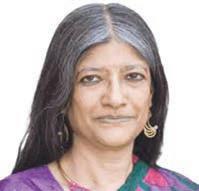

LUIZ INÁCIO LULA DA SILVA TAKES OVER A DEEPLY DIVIDED COUNTRY, AND A CONGRESS DOMINATED BY RIGHTWING PARTIES
LAST POLLS BEFORE ELECTIONS PREDICT THAT OPPOSITION HEAD BENJAMIN NETANYAHU IS VERY CLOSE TO ACHIEVING THE 61-SEAT MAJORITY HE NEEDS IN THE KNESSET TO COME BACK TO POWERProject SyndicAte Jayati Ghosh
Pakistan Telecommunication Authority (PTA) has received Rs. 11.43 Billion (equivalent to USD 52.44 Million) against third annual instalment of license renewal fee from CMPak Limited (Zong) in line with payment terms of the license renewed in the year 2019. The amount has also been deposited in Federal Consolidated Fund (FCF). With this deposit in FCF, the cumulative deposit by PTA in FCF during the current financial year i.e. 2022-23 has become Rs. 22.98 Billion (equivalent to USD 106 Million). PTA has so far deposited USD 1.79 Billion in equivalent Pak Rupees amounting to Rs. 300 Billion in FCF, received from cellular mobile license renewals and spectrum auction since 2019.
Timely payment of electricity bills is the moral and national responsibility of consumers the electricity connections of non-paying customers should be disconnected without discrimination. Dr. Muhammad Amjad Khan
IESCO Chief. Timely collection of electricity dues is the most important responsibility of the electricity distribution company, due to which uninterrupted supply of electricity and timely completion of ongoing projects for system up gradation is possible. IESCO Chief Dr Muhammad Amjad Khan has requested the electricity defaulters that lists of defaulters have been compiled and orders have been issued to disconnect the meters of those who do not pay the bills, to avoid disconnect of their electricity connections. Make timely collection possible in all cases. The Chief Executive has requested the esteemed customers that if they have not received the electricity bill due to any reason, they can also get the duplicate bill from the Lesco website, www.iesco.com.pk, SDO or Customer Services Offices. The IESCO chief further asked the consumers to never pay cash to any unrelated person or unauthorized IESCO employee for the electricity bill, they should submit their electricity bills to the respective banks/post offices or online.
Indus Motor Company (IMC) under its social responsibility banner, “Concern Beyond Cars”, gifted 10 electric wheelchairs to HANDS Pakistan at a small ceremony held at the latter’s head office in Gadap. The assistive devices were handed over by IMC’s Asad Abdullah, Head of CSR and Corporate Communication, to CEO HANDS, Mr Shaikh Tanveer Ahmed. HANDS Pakistan is amongst the top not-for-profit organisations in the country, delivering services to the society’s less fortunate in areas spanning health, education, livelihood, water, sanitation, infrastructure, and disaster risk reduction. IMC’s CEO Ali Asghar Jamali commented,” ‘Mobility for All’ is Toyota’s transformational vision of the future as a mobility company pursuing ways to provide inclusive and accessible mobility options to the greatest number of people. HANDS over the decades has been doing a wonderful job, of uplifting communities across the country.
Lahore: The 23rd Convocation of the University of Management and Technology (UMT) Lahore is taking place tomorrow on Wednesday, November 2, 2022 at UMT Greens. Degrees, gold medals and awards would be distributed among the graduating participants by Chairman of the Senate of Pakistan, Muhammad Sadiq Sanjrani and Patron-in-Chief All Pakistan Textile Mills Association (APTMA), Dr Gohar Ejaz. The convocation ceremony will begin tomorrow at 3:00 p.m. STAFF REPORT
ABUDhabi International Petroleum Exhibition & Conference (ADIPEC), one of the world’s most influential energy sector event, is taking place from 31-03 November 2022 in Abu Dhabi National Exhibition Centre (ADNEC), United Arab Emirates, under the patronage of President of the United Arab Emirates.
Pakistan’s leading national oil and gas companies, Petroleum Institute of Pakistan and Ministry of Energy (Petroleum Division) is representing Pakistan in this event by setting up a grand double-deck Pakistan Pavilion which is spread over 100 square meters showcasing Pakistan and its upstream, midstream, and downstream energy
sectors. The theme of the Pakistan Pavilion is ‘Pakistan – A Gateway to Energy Investments’. The exquisitely created Pavilion will provide Pakistan’s oil and gas professionals an exceptional opportunity to network and explore new business opportunities, encourage foreign direct investment in the country, promote Government’s investor friendly policies and enhance country’s overall image.
Participating companies from Pakistan includes Government Holdings (Private) Limited (GHPL), Mari Petroleum Company Limited (MPCL), Oil & Gas Development Co. Limited (OGDCL), Pak-Arab Refinery Limited (PARCO), Pak-Arab Pipeline Company Limited (PAPCO), Pakistan Petroleum Limited (PPL), Pakistan Refinery Limited (PRL), Pakistan State Oil (PSO) and Sui Northern Gas Pipelines Limited
(SNGPL) with Petroleum Institute of Pakistan (PIP) as a focal point of the industry, under the patronage of Ministry of Energy (Petroleum Division). The top officials of these companies will represent their respective organizations at the Pakistan Pavilion and hold B2B meetings at the event. In the past Pakistan Pavilion & participation has received extensive appreciation by the national and international oil & gas community in Pakistan and UAE.
eFU Life Wins GBo award 2022 for Best Domestic Life Insurance Company EFU Life Assurance Limited, the leading life insurance provider in the country, has been awarded Best Domestic Life Insurer of the Year – Pakistan, at the Global Business Outlook (GBO) Awards 2022. As an industry leader, EFU Life is committed to inno-
vation in its business processes and product offerings coupled with a strong technological capacity and effective use of digitalization.
Speaking on the occasion, Taher G. Sachak, EFU Life’s CEO and Managing Director, said ‘as a Company, our vision is to bring as many households as possible in Pakistan under the insurance safety net by offering a comprehensive range of financial planning solutions that are affordable and suit every pocket’. He also added ‘Whilst insurance has been slow to pick up on digitalization in Pakistan, EFU Life has been actively leveraging digital tools, engaging multiple market segments by offering micro, nano products through Commercial banks, Micro Finance Institutions, Branchless banks, Mobile Network Operators, and Micro Small Medium Enterprises (MSMEs)’.
Jubilee Life Insurance, the largest private sector insurer in Pakistan, has extended its list of notable acknowledgments with AsiaMoney Award 2022. AsiaMoney is a prestigious platform that adjudges financial performance of companies on a set of strict criteria to ascertain the most outstanding companies in various countries. Jubilee Life Insurance is the first and the only life insurance company in
Pakistan to win this prestigious award.
Jubilee Life Insurance also made its name in Best Corporate Report Award 2021. The Company received the accolade in recognition of its excellence in corporate reporting, promoting accountability and transparency, as well as responsible presentation of economic, environment and social performance of the business.
Jubilee Life Insurance was recently ranked in the list of Top 25 best performing companies at the Pakistan Stock Exchange based on its good fi-
nancial ratios, effective CSR as well as Diversity, Equity & Inclusion practices. It is the only insurance company to be awarded with the PSX Top 25 Companies Award thrice during last 10 years. The Company has been at the forefront of not just financial and operational excellence but also digital innovation. The two accolades: ‘Best Integrated Media Strategy’ and ‘Best Content of the Year’ at Pakistan Digital Awards 2022, serve as a testament to the claim.
Commenting on these achievements, Mr. Javed Ahmed, MD & CEO
Jubilee Life Insurance, said; “At Jubilee Life Insurance, our goal has always been to excel at all fronts. Besides exceptional achievement on the financial side, we are making headways on other avenues as well. Winning the AsiaMoney Award and the Best Corporate Report Award 2021 after having recently received the PSX Top 25 Companies accolade is a tremendous boost of confidence for the Company, its customers, stakeholders and the team of employees who made this all possible.”
 Lahore STAFF REPORT
Lahore STAFF REPORT
Tibbi.pk, a healthtech startup has won the title for SHE LOVES TECH Pakistan 2022 winner from amongst 1000+ applicants and 10 local rounds across the country.
Tibbi’s mission is to help the citizens of Pakistan enjoy a healthy, happy and long life by spreading medical and medicinal awareness while also offering clinical accessibility, online doctor consultation and online medicine home delivery at a reduced cost. Mandma NFTs, a web 3.0 startup was declared runner up for the final pitch round. Their startup creates virtual wearable accessories and NFT’s for metaverse.

TION, a tech nonprofit imparting digital and financial literacy, and startup support to female-led micro-enterprises in collaboration with HBL as its partner; has brought the World’s largest startup competition for women in technology, She Loves Tech to Pakistan for the sixth consecutive year. The aim of this platform is to close the gender funding gap by offering opportunities for capacity building, networking and access to funding to tech-based female-led startups. The global startup competition performed regional rounds across ten cities in Pakistan showcasing womenled startups with the goal of promoting women’s empowerment and advancement. In a country where under 25% women are part of the formal economy,
entrepreneurship combined with technology can become a strong avenue for economic growth.
Held at the Indigo Hotel, Lahore on Wednesday, October 26, 2022, the final round of the She Loves Tech Pakistan 2022 competition had the Acting Consul General Lahore, Daryn Yoder, Veteran actor and development sector professional, Simi Raheal, MPA and Spokesperson to CM and Punjab Government, Musarrat Jamshed Cheema and Head of Branch Operations and Account Services at HBL, Fauzia Janjua as the Chief Guests for the evening.
Speaking on the occasion, Ms. Raheel said, “ Creativity, Hope, and Dreams are the three words that one needs to engrave in the heart if one truly wants something. Those who do
not pursue the conventional norms and wander; create. All of the startups here have created ideas because they thought of alternatives. They have made the world curious about Pakistan and what Pakistani entrepreneurs, especially females, bring to the table. I stand here today with great pride and respect for all the girls who created a space for themselves.”
Commenting on the initiative, Fouzia Jabeen Janjua, Head Branch Operations and Account Services –HBL, said, “HBL has a strong commitment to advancing women’s economic empowerment in Pakistan. Through this partnership, we are committed to supporting digital literacy, financial inclusion, and entrepreneurship for women.
After an exciting match, Diamond Paints/Sheikhoo Steels won the Shaukat Khanum Pink Polo Cup and defeated FG/Din Polo at the Jinnah Polo Fields (JPF), Lahore.
Each year, Shaukat Khanum Memorial Trust (SKMT) organises an extensive breast cancer awareness campaign and the Pink Polo Tournament was part of this campaign.
Before the start of the match, a number of exciting activities were organised for the audience and these included women’s tent-pegging competition, cavalcade, exhibition by Harley-Davidson bikers, and a performance by the army band.
After the tournament, the event participants enjoyed an entertaining musical evening with Malkoo and Quadram band.
On this occasion, Dr Faisal Sultan, CEO of SKMT emphasised on the importance of early detection of breast cancer and said that if women seek medical advice by reaching hospitals in a timely manner then chances of cure are very high.
Iqra Aziz, celebrity ambassador for Shaukat Khanum's breast cancer awareness campaign said that we can save lives of thousands of women by raising awareness about breast cancer.
Director Marketing of SKMT, Mr Tariq Azam said that just like previous years, SKMT will continue to raise awareness about breast cancer in the future as well.
FBL achieved the landmark of Rs. 1 Trillion mark in Balance Sheet footings with a record Profit Before Tax of Rs. 15.0 billion, 51% higher than the corresponding period last year. The Board of Directors of Faysal Bank Limited (FBL), in their meeting held on October 27, 2022, approved the financial statements of the Bank for the nine months ended September 30, 2022 and announced an interim cash dividend of Rs. 5.50 per share i.e. 55%. This is in addition to interim cash dividend for the second quarter ended June 30, 2022 already paid at Rs. 0.50 per share i.e. 5%. Al-Hamdulillah, the Bank is very close to the completion of the requirements of converting Faysal Bank Limited into a full-fledged Islamic bank. Accordingly, all the Non-Shariah Compliant retained earnings of the Bank are being distributed to the shareholders as cash dividend. FBL has delivered exuberant performance in the nine months of 2022 with a Profit Before Tax (PBT) of Rs. 15.0 billion, 51% higher than the Rs. 9.9 billion in the corresponding period last year. However, the increase in Profit After Tax (PAT) is restricted to 26% from Rs. 6.1 billion in 9m’21 to Rs. 7.7 billion in 9m’22 on the back of extremely high and retrospective tax measures announced in the Federal Budget. FBL achieved the landmark of Rs. 1.0 trillion mark in balance sheet footings on the back of strong deposit mobilization and borrowings.
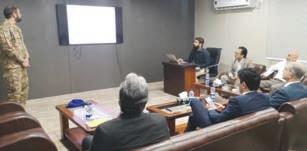
PTA receives PKR 11.43b against third instalment of license renewal fee from ZongSTAFF REPORT
such an event from reoccurring, Han said during a live broadcast.
SOUTHKorean Prime Minister Han Duck-soo vowed on Monday to conduct a thorough investigation into the stampede that killed around 154 people during Halloween over the weekend in Seoul’s Itaewon district.
Officials said 154 had been killed and 149 injured, with 33 people in serious condition. The latest Yonhap News Agency report said that 26 foreigners from 14 countries were among the dead, including four from China.

The government will do its best to improve the necessary systems to prevent
Twitter will revise its user verification process, Elon Musk said in a tweet on Sunday, just days after he took over one of the world’s most influential social media platforms.
“Whole verification process is being revamped right now”, Musk said in his tweet without giving more details.
Twitter is considering charging for the coveted blue check mark verifying the identity of its account holder, technology newsletter Platformer reported on Sunday, citing two people familiar with the matter.
Users would have to subscribe to Twitter Blue at $4.99 a month or lose their “verified” badges if the project moves forward, according to the report.
The CEO of Tesla Inc. has not made a final decision and the project could still be scrapped but according to Platformer, it is likely that verification will become a part of Twitter Blue.
Separately, The Verge reported on Sunday that Twitter will increase the subscription price for Twitter Blue, which also verifies users, from $4.99 a month to $19.99 a month, citing internal correspondence seen by them.
Twitter Blue was launched in June last year as the platform’s first subscription service, which offers “exclusive access to premium features” on a monthly subscription basis including an option to edit tweets.
The feature to edit tweets was also made available earlier this month after Musk launched a Twitter poll in April asking his millions of followers whether they wanted an edit button. Over 70 percent had said yes.
Musk has also requested that logged-out users visiting Twitter’s site be redirected to Explore page which shows trending tweets, according to a separate Verge report on Sunday citing employees who were familiar with the matter.
Tens of thousands of people had crowded into narrow streets and alleyways of Itaewon on Saturday for the first virtually unrestricted Halloween festivities in three years. Many of the revelers were in their teens and dressed in costume.
But chaos erupted when people poured into one particularly narrow and sloping 3.2-meter-wide alley, even after it was already packed, according to Yonhap.
“Some of them began to fall over, causing others to fall down like dominoes and pile up on one another,” it added.
South Korean President Yoon Sukyeol, who has declared a period of national mourning and designated Itaewon a disas-
ter zone, visited a memorial altar near the Seoul city hall and paid his respects to victims with first lady Kim Keon-hee on Monday, his office said.
Chinese President Xi Jinping sent a message of condolence on Sunday to Yoon over the Halloween tragedy.
Other world leaders including U.S. President Joe Biden, British Prime Minister Rishi Sunak, Russian President Vladimir Putin, Japanese Prime Minister Fumio Kishida, Canadian Prime Minister Justin Trudeau, German Chancellor Olaf Scholz, French President Emmanuel Macron and Ukrainian Foreign Minister Dmytro Kuleba have also sent condolences to South Korea after the deadly crush.
Chinese State Councilor and Foreign Minister Wang Yi and U.S. Secretary of State Antony Blinken exchanged views on China-U.S. relations during a phone conversation on Monday, according to the Chinese Foreign Ministry.
Getting China-U.S. relations back to a stable development track fits the interests of both sides and meets the expectations of the international community, Wang said.
Noting that the U.S. side has imposed a new export ban on China and restrictions on investment in China, he said such acts seriously violate the free trade rules, damage China’s legitimate rights and interests, and must be
rectified.
He urged the U.S. side to stop the practice of containing and suppressing China and refrain from creating new obstacles to relations between the two countries.
The 20th National Congress of the Communist Party of China (CPC) has sent messages to the world that China will adhere to the purpose of its foreign policy of safeguarding world peace and promoting common development, continue to pursue its fundamental state policy of opening up, promote human progress through a Chinese path to modernization, bring fresh opportunities to the world with China’s new development, which provide stability for the turbulent international situation, the foreign minister said.
China’s internal and external policies are open and transparent, and the U.S. side should stop subjective speculation with bias and avoid being blinded by ideological prejudice, Wang added.
Blinken said the U.S. side pays close attention to the 20th National Congress of the CPC and the report to the Party congress. The U.S. side is willing to maintain communication and cooperation with China in the next phase of U.S.-China relations and explore the foundations of the relationship between the two countries.
The two sides also exchanged views on the Ukraine issue. Wang said all parties should increase diplomatic efforts to avoid further escalation or even loss of control of the situation, adding that as long as there is hope, the door to negotiations should not be closed.
An American woman who grew up on a farm in Kansas and joined the Islamic State in Syria, where she led an all-female military battalion, is to be sentenced Tuesday for providing support to a foreign terrorist group. Allison Fluke-Ekren, 42, faces up to 20 years in prison after pleading guilty to terror charges in June in a US District Court in Alexandria, Virginia.
“For at least eight years, Fluke-Ekren committed terrorist acts on behalf of three foreign terrorist organisations across war zones in Libya, Iraq, and Syria,” US attorney Raj Parekh said in a pre-sentencing memo.
“Fluke-Ekren brainwashed young girls and trained them to kill,” Parekh said. “She carved a path of terror, plunging her own children into unfathomable depths of cruelty by physically, psychologically, emotionally, and sexually abusing them.”
Parekh, urging Judge Leonie Brinkema to impose the maximum 20-year sentence, traced Fluke-Ekren’s path from her upbringing on an 81-acre (33-hectare) farm in Kansas to her apprehension in Syria after the 2019 territorial defeat of IS.
While other Americans traveled to Syria and Iraq to join IS, most were men and Fluke-Ekren is the rare American woman who occupied a senior position in the ranks of the now-defunct so-called Islamic Caliphate.
Born Allison Brooks, she grew up in a “loving and stable home” in Overbrook, Kansas, and was considered a “gifted” student, the US attorney said.
She dropped out of high school in her sophomore year, however, and married a local man named Fluke, with whom she had two children.

Her son from that marriage testified anonymously about years of abuse inflicted on him and his siblings by their mother.
“My mother is a monster without love for her children, without an excuse for her actions,” said her son, who plans to attend Tuesday’s sentencing in Alexandria. “She has the blood, pain, and suffering of all of her children on her hands.”
After leaving her first husband, FlukeEkren attended the University of Kansas, where she married a fellow student named Volkan Ekren and became a Muslim. She later earned a teaching certificate from a college in Indiana.
They had five children together and adopted another after the child’s parents were killed as suicide bombers in Syria.
‘ExtrEmist idEology and violEncE’: In 2008, the family moved to Egypt and in 2011 to Libya where, the US attorney said, “Fluke-Ekren’s dogged pursuit to obtain positions of power and influence to train young women in extremist ideology and violence began.”
They were in Benghazi in September 2012 when the militant group Ansar alSharia attacked the US mission and CIA office there, killing the US ambassador and three other Americans.
Fluke-Ekren, a fluent Arabic speaker, assisted Ansar al-Sharia by “reviewing and summarizing the contents of stolen US gov-
ernment documents.”

The family left Libya in late 2012 or early 2013 and moved around between Iraq, Turkey and Syria, becoming deeply involved with IS and living in the group’s Mosul stronghold for a time.
After Fluke-Ekren’s husband — the leader of an IS sniper unit — was killed in 2015 she forced their 13-year-old daughter to marry an IS fighter, according to the US attorney.
Fluke-Ekren, who adopted the nom de guerre Umm Mohammed al-Amriki after joining IS, would go on to marry three more times and have four more children.
Her fourth husband was an IS military leader who was responsible for the IS defense of Raqqa in 2017.
In 2017, Fluke-Ekren became the leader of a battalion of female IS members called “Khatiba Nusaybah,” which provided military training to more than 100 women and girls, according to the US attorney.
“During training sessions, Fluke-Ekren instructed the women and young girls on the use of AK-47 assault rifles, grenades, and explosive suicide belts” Parekh said.
“One of those children, some of whom were as young as 10 or 11-years-old, was her own daughter.”
Aircraft and equipment to participate in Airshow China 2022 have been arriving over the past few days in Zhuhai, South China’s Guangdong Province where the expo will be held next week, with observers eagerly anticipating the exhibition of China’s drone and anti-drone systems at a time when the importance of the two is highlighted in the Ukraine crisis.
A pair of J-16 heavy fighter jets landed in Zhuhai on Sunday in preparation for the upcoming air show, China Central Television (CCTV) reported on Monday.
Other types of aircraft including the JL-10 advanced trainer jet and the Y-20 large transport aircraft, as well as the Red Falcon Aerobatic Team, have also arrived at the site, CCTV reported.
The Chinese People’s Liberation Army (PLA) Air Force will send aircraft in the 20series, which also includes the J-20 stealth fighter jet, and the PLA Army will for the first time send helicopters for flight
performances, the CCTV report said.
According to media reports, China will
exhibit a large collection of drones, including the Wing Loong series armed
reconnaissance drones, the CH-7 highaltitude long-endurance drone, the Twin-Tailed Scorpion D four-engine large drone and the WZ-8 high-altitude highspeed reconnaissance drone.
Anti-drone systems developed by China will also make their first appearances at the Airshow, CCTV reported.

China has developed many types of missiles, guns, lasers and radars with different working principles that can work in tandem in targeting low, slow, small aircraft like drones, military observers said.
Drones and anti-drone systems are expected to be some of the highlights of this year’s Airshow China after this duo of “spear and shield” was underscored in the ongoing conflict between Russia and Ukraine, they said.
In modern warfare, the application of drones has become wide, and it has also become easy to obtain drones. In the Russia-Ukraine conflict, not only were dedicated armed reconnaissance drones deployed, simple suicide drones or
loitering munitions were also used, Wei Dongxu, a Beijing-based military expert, told the Global Times on Monday.
Those simple drones fly low and slow, and they have a small radar cross section. Conventional radar systems targeting fighter jets and cruise missiles often have a hard time detecting them.
They are also cheap and can be easily mass produced, Wei said.
China is in a world-leading position in anti-drone technologies, as China has developed many types of electronic jamming devices and vehicle-mounted laser systems that are drone killers by nature, Wei said.
China is also a world-class developer of drones capable of independently developing advanced stealth attack drones, Wei said.
Since drones are difficult to intercept in flight, another option is to destroy them before they take off, or even better, destroy their manufacturing facilities, and using a country’s own drones is a very good choice for these missions, a Chinese drone expert who requested anonymity told the Global Times.
PAKISTANand India are involved in talks to play a historic Test match on Australian soil after the cricketing world witnessed epic class at the T20 World Cup on October 23, which saw over 90,000 people at the Melbourne Cricket Ground (MCG).

The arch-rivals last played a Test against each other in 2007 and it has been over ten years since they last played a white-ball series Since then, the two have only met when they have been drawn
against each other in ICC and ACC tournaments.
As per former Australian all-rounder Simon O’Donnell, there’s also plans for a Test match to be held Down Under.
“That [their T20 World Cup clash] was extraordinary,”O’Donnell said on SEN Radio.
“That game itself is the one that’s held the tournament up so far, people keep referring back to it. There was 90,000 at a neutral venue, there was extraordinary emotion, the scenes of the game, the tightness of the game, the pressure,” he added.
“It was magnificent sort of stuff, to the
level that I can say there will be discussions being had, or there are discussions being had to play a Test match here,” he maintained.
O’Donnell claimed that there is also the possibility of a triangular ODI series between India, Pakistan and Australia
“There’s also the possibility of a triangular One-Day series between India, Pakistan and Australia or a Test match between India and Pakistan. My word there are [conversations happening] in the wake of this [T20 World Cup clash]. There are already discussions taking place,” he concluded.

Defending Champions Lahore Qalandars will make the first pick in the HBL Pakistan Super League 2023 Player Draft. The Pick Order was decided through a random draw on Monday at the Pakistan Cricket Board (PCB) offices and participated by representatives of the six franchises. The winners of the 2019 edition, Quetta Gladiators, and 2021 championships, Multan Sultans, will have second and third picks. The fourth and fifth picks will be done by 2020 winners Karachi Kings and two-time champions (2016 and 2018) Islamabad United. Peshawar Zalmi, who won the first final of the HBL PSL to be played in Pakistan in 2017, will make the sixth pick. The next 17 rounds were decided through a special statistical tool. Usman Wahla, PSL 8 Tournament Director said on Monday : “We have set small milestones for our flagship event and Pick Order for HBL PSL 2023 was one of the targets. This has set the tone for this year’s Player Draft as the teams will now have absolute clarity on their turn and how they will make best use of their chances to pick players for one of the most grueling and fiercely-contested leagues. “Player Registration window for foreign players is also open and we are receiving encouraging responses, which is a testament to the reputation of the HBL PSL and how much the top players want to be part of it. “Next year’s event will be staged at four venues – Karachi, Lahore, Rawalpindi and Multan - and we are working extremely hard to not only deliver this event according to its stature and reputation, but also introduce a few initiatives to make the event more spectator-friendly.” The details about the HBL PSL 2023 Player Draft will be announced in due course.
Marcus Rashford’s 100th goal for Manchester United sealed a 1-0 win against West Ham as the England forward made his push for a World Cup place on Sunday. Rashford has been one of United’s most improved players this season after several years in the doldrums. But the 24-year-old is still not guaranteed a place on England’s flight to Qatar for the World Cup in November. Rashford, who was left out of England’s most recent Nations League squad, took the chance to remind Three Lions boss Gareth Southgate of his qualities with a fine display capped by the first-half winner at Old Trafford. With Southgate watching from the stands, Rashford’s seventh goal in all competitions this season was perfectly timed before the England manager names his World Cup squad. After netting against Sheriff in the Europa League on Thursday, Rashford said Erik ten Hag was a “joy” to play for as he hailed the United manager’s role in his revival. Thanks to Rashford, the 22nd player to score a century of goals for United, and a series of superb saves from David de Gea, Ten Hag’s side are up to fifth place in the Premier League. Unbeaten in their last eight games in all competitions, United are one point behind fourth-placed Newcastle in the race to qualify for next season’s Champions League. West Ham manager David Moyes has still to win away against United in the Premier League, losing 12 of his 16 visits to his former club. United had to ride their luck at times, with their defence creaking as the much-maligned Harry Maguire made his first league start since August 13 in place of the injured Raphael Varane.
Australia got their Twenty20 World Cup defence back on track with a 42-run win over Ireland at the Gabba in Brisbane on Monday.
Ireland, chasing Australia’s 179-5, were all out for 137 in the 19th over to put Australia level on points with New Zealand, who have a game in hand, at the top of Group 1.
Ireland had outside hopes of reaching the semi-finals before the match but they
were blown away initially by the pace and inswing of Mitchell Starc and then by the pressure of chasing 180 to win.
They slumped to 25-5 and handed the World Cup hosts a comfortable win despite a superb unbeaten 71 from Lorcan Tucker. Earlier Aaron Finch had stormed back into form with 63 off 44 balls to answer a growing number of critics who had called for the Australian captain to be dropped after a poor run with the bat.
Finch stayed patient as Australia lost their first three wickets to tight Irish bowling.
Shadab Khan, Pakistan’s vice-captain, had an interesting day against the Netherlands on Sunday, spinning a web around the Dutch hitters. After going winless in their first two Super 12 matches, Babar Azam’s Pakistan was keen to resume their ICC T20 World Cup campaign as they faced the Netherlands at Optus stadium in Perth.
Shadab emerged as the Green Army’s bowler of choice in match No. 29 of the T20 World Cup. As Pakistan reduced the Netherlands to 91-9 in 20 overs, the ace spinner dismissed Max ODowd, Colin Ackermann, and Tom Cooper. Shadab took three wickets and allowed 22 runs against the Dutch. The Green Army’s seasoned campaigner was voted Player of the Match for his all-around performance against the Netherlands.
Shadab was asked about Babar’s slump in form at the T20 World Cup during the regular postmatch news conference. Babar, regarded as one of the best batters in
all formats, has battled for form in the T20 World Cup Super 12 stage. Shadab, who has come out in favor of Pakistan’s captain, believes Babar is one good knock away from silence.
“He is a world-class player, no doubt, but he is human also. Sometimes, he makes mistakes, but he is our leader; he is our best captain. He supported us, so we have to support him now. It’s just three games; no one should worry about his form because he is a world-class player,”
He then took advantage as the Ireland attack began to falter under the pressure of an onslaught from Finch and Marcus Stoinis, who blasted 35 off 25 balls.
Ireland started the run chase briskly but suffered a big loss as captain Andy Balbirnie was bowled by Pat Cummins for six off the last ball of the second over.
He was followed almost immediately by the dangerous Paul Stirling, who was caught at mid-off by Cummins from parttime spinner Glenn Maxwell for 11.
Maxwell then had Harry Tector caught at square leg with Ireland on 24
and the game was as good as over one run later when Starc clean bowled Curtis Campher for a duck.
Starc was bowling with real pace and he struck again with another beautiful inswinger to account for George Dockrell, leaving Ireland staggering at 25-5.
Tucker and Gareth Delany led a slight recovery until Delany skied to Maxwell trying to belt Stoinis for six.
Tucker, who had come in at number three, played a lone hand, amassing his 71 from 48 deliveries until he ran out of partners.
Shadab said. Pakistan captain Babar has scored eight runs in three innings at the T20 World Cup.

“He is one shot away from returning to form. Like Rizwan today, he scored runs. So hopefully, Babar scores for us in the next game. The next game is a big one, so hopefully, he will score a run for the team,” he added. Babar-led Pakistan will meet South Africa in the Super 12 stage of the T20 World Cup at the Sydney Cricket Ground (SCG) on Thursday.
Batsman Aiden Markram said South Africa are taking nothing for granted despite beating India on Sunday to put themselves in the driving seat for qualification for the Twenty20 World Cup semi-finals. The victory by five wickets on a tricky track at Perth Stadium put the South Africans top of Group 2 with five points, one clear of India and Bangladesh with two Super 12 matches left to play. Only the top two go through but with Zimbabwe (three points), Pakistan (two) and the Netherlands (0) all still technically in the hunt, Markram said South Africa were focusing only on improvement. “If we are top of the log, I suppose it’s a good thing but we’re certainly not thinking with a foot in the door at the moment,” the righthander told reporters at Perth Stadium. “We’ve still got a massive game against Pakistan and we’ve got the Netherlands as well. And we’ve seen the teams that have joined the Super 12 stage can beat any team on their day. “So there’s still a lot of cricket to be played for us. And it’s pretty much about trying to get better game-by-game. We give ourselves the best chance to qualify if we do.” South Africa, who are targeting a first limited overs World Cup triumph, arrived in Australia looking to their pace attack to give them an edge. The fast bowlers delivered in Perth with Lungi Ngidi taking 4-29 and Wayne Parnell 3-15 to help restrict Kohli and co to 133-9. The batters have also held up their end with all of the top five in the order barring skipper Temba Bavuma managing a significant innings over the first three games.
missed, or to take advantage of the opportunity, which I had never had.
“My devices turned into vices.”
Cricket legend Wasim Akram says it took the death of his first wife Huma to spark him into finally kicking his addiction to cocaine which had replaced the thrill of playing when he retired.
The 56-year-old former pace bowler and a key member of the team that won the 1992 World Cup told the Sunday Times it was Huma who “found me out” and advised him to seek help.
However, that did not work, Akram said an interview to promote his new autobiography “Sultan: A Memoir”, because “the doctor was a complete con man” and he returned to taking cocaine.

It took Huma’s death aged just 42 in October 2009 to finally persuade him to give it up. Akram — who took over 400 wickets in 104 Tests — said “the culture of fame in south Asia is all-consuming, seductive and corrupting” and he fell into that trap after he retired in 2003.
“It was a substitute for the adrenaline rush of competition, which I sorely
Akram — who was diagnosed with diabetes when he was 30 — said he first took cocaine when he was offered some at a party in England.
“My use grew steadily more serious, to the point that I felt I needed it to function,” he said.
‘Facility was brutal’: Huma lived between England and Lahore with their two sons, Tahmoor and Akbar, but felt isolated as Akram’s media commitments took him all over the world.
“It (cocaine) made me volatile,” he said. “It made me deceptive. Huma, I know, was often lonely in this time […] she would talk of her desire to move to Karachi, to be nearer her parents and siblings. “I was reluctant. Why? Partly because I liked going to Karachi on my own, pretending it was work when it was actually about partying, often for days at a time.”
Akram agreed with Huma he needed help after her “discovering a packet of cocaine in my wallet.”
“I couldn’t control it,” he said. “Four (lines) would become a gram, a gram would become two.
“I could not sleep. I could not eat. I grew inattentive to my diabetes, which caused me headaches and mood swings.”
Akram said rehab in Lahore proved a total failure, not least because the doctor placed dollar signs ahead of curing his patients.
“This facility was brutal: a bare building with five cells, a meeting room and a kitchen,” he said.
“The doctor was a complete con man, who worked primarily on manipulating families rather than treating patients, on separating relatives from money rather than users from drugs.”
Far from cured, he resumed his habit as “the lure of my lifestyle remained” and indulged in it at the 2009 Champions Trophy.
However, it was to be the final rush as two weeks after the tournament finished Huma died of mucormycosis, a rare fungal infection. The tragedy finally convinced Akram to give up cocaine.
“Huma’s last selfless, unconscious act was curing me of my drug problem,” said Akram, who has since remarried Australian Shaniera Thompson with whom he has had a daughter Aiyla.
“That way of life was over, and I have never looked back.”
INISTERfor Planning, Development and Special Initiatives Ahsan Iqbal Monday said Prime Minister Shehbaz Sharif’s visit to China would take the bilateral trade relations to new heights as both the countries would sign multiple projects worth billions of dollars.
The PM’s visit to China will help preparing a road map to take the county’s annual exports to $100 billion and beyond, the minister said while addressing a press conference here. He said during the visit, Pakistan would sign an agreement with China to seek first hand technical experience from the all weather friendly country.
He said China, on many occasions have expressed its desire to help Pakistan making industrial economy but unfortunately previous government of PTI wasted four precious years by suspending the most important mega project of China Pakistan Economic Corridor (CPEC).
On October 27, meeting of the JCC was held virtually in which the CPEC projects were reviewed, and both sides agreed to ex-
pand the scope of the project and to expedite work of ongoing projects under CPEC. It was also agreed that the final agreement would be signed during visit of Prime Minister Shehbaz Sharif to China.
Ahsan Iqbal highlighted that Pakistan’s most important project was the railway’s ML-1 as the existing system had become
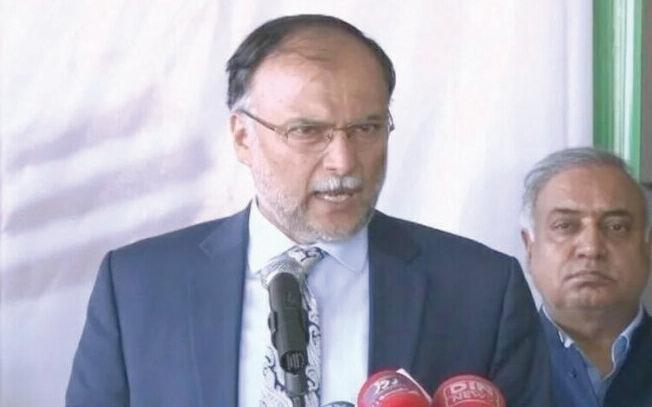
outdated therefore this project would have to be initiated on emergency basis.
Unfortunately, he pointed out that due to the criminal negligence of the previous government, this project witnessed zero progress during last several years which also caused increase in cost by $3 billion from earlier approved cost of $6.8 billion to $9.8 billion.
Further, he informed that a new road project of Karachi-Hyderabad motorway would also be signed during the visit and the work on new motorway between Karachi and Hyderabad would start after the visit.
Similarly Karachi’s KCR project would also be signed during the visit to provide the citizens state of the art transportation facility in line with the orange train in Lahore.
Dera Ismail Khan-Zhob road project and Mirpur-Muzafarabad-Manshehra road project are also likely to be signed under CPEC, he said adding that Babusar tunnel project has also been included in the CPEC.
He said the both countries would also sign a project to establish national forensic laboratory in Islamabad to help the security institutions to cope with the extremism and terrorism by using the modern technology.
Ahsan Iqbal informed that an agreement for exporting agriculture products from Pakistan to China would also be signed besides inking a project to enhance the capacity of Pakistan’s meteorological department in forecasting weather.
This visit of Prime Minister is of utmost importance as it would not only bring the
It was the kind of attack Islamabad had dreaded. A highly educated female suicide bomber killed three Chinese teachers in Karachi in April along with their local driver, targeting nationals from Pakistan’s most important partner and seeking to undermine a relationship on which Islamabad’s financial survival largely depends.
The blow threatened a major segment of Beijing’s Belt and Road Initiative (BRI), a $65 billion network of roads, railways, pipelines and ports in Pakistan that will connect China to the Arabian Sea and help Islamabad expand and modernise its economy.
Proscribed Baloch Liberation Army (BLA) claimed responsibility for the attack after the woman — a young, educated mother from a well-to-do family — blew herself up in an assault captured on CCTV and broadcast on local news channels.
In a video on social media, the militant group warned China to leave Pakistan or face further carnage.
Even though months have passed since the attack, Pakistan remains deeply worried. “Attacks on the Chinese nationals and projects in Pakistan are of grave concern for
the government,” the interior ministry said in a statement to Reuters last week, adding that the government was in active pursuit of such militant outfits.
BLA, the group that issued the video, is part of a militant campaign that usually targets security forces.
But in recent years the BLA has attacked Chinese nationals, because, it says, Beijing has ignored warnings not to enter deals and agreements regarding Balochistan. China is involved in major mining and infrastructure projects in the resource-rich province, including the deep-water Gwadar port, all part of the China-Pakistan Economic Corridor (CPEC).
At the start of the video, a masked gunman addresses China. Speaking in English he says: “President of China […] you still have time to get out of Balochistan, otherwise you will be taken out of Balochistan in such a way that you will never forget.”
Shortly afterwards, schoolteacher Shari Hayat Baloch, 30, is filmed walking in a park with her young son and daughter and later addressing the camera in combat fatigues. Smiling and calm, the 30-year-old thanks fellow militants for giving her the “opportunity” to become the movement’s first female suicide bomber.
CONCERNS IN BEIJING: A team of Chinese officials travelled to Pakistan to as-
Pakistan Tehreek-e-Insaf (PTI) Chairman and former prime minister Imran Khan on Monday said that his party’s caravan will reach Islamabad within nine days. Addressing the PTI’s participants in the Mor Aimanabad area of Gujranwala, the former prime minister expressed his gratitude to his supporters, saying that in his way towards the city, people showered their love for him. Reiterating that his movement is not about doing politics, but ‘jihad’ to bring actual change in the country, the PTI chief said that his motive to gather his supporters to Islamabad is to bring real freedom to the country. Slamming Prime Minister Shehbaz Sharif, Imran said, the one who plunder Rs24 billion has been allowed to come into power. He went on to say that the nation will get freedom, where the prevailing law will be same for both the privilege and underprivileged segments of society. Taking a dig at PML-N supremo Nawaz Sharif, PML-N vice president Maryam Nawaz, former president Asif Ali Zardari and Interior Minister Rana Sanaullah, Imran went on to say that the biggest mafia of the country has been imposed on the masses. Saying that when Nawaz was asked to provide a money trail, he ran away, Imran added that now he [Nawaz] wants a suitable situation for himself and understanding with the powerful segments.
sist in investigations, the interior ministry said, a sign of the seriousness Beijing attaches to the attack. The visit has not been previously reported. The Chinese officials supported Pakistan’s counter-terrorism forces in areas such as CCTV footage enhancement and data retrieval from cell phones, the ministry said. The team left in late August after spending nearly two months trawling through tens of thousands of data files, according to four local sources directly involved in the probe. The leads they found helped Pakistan zero in on the main suspect in the university attack, who was arrested in July.
China’s foreign ministry did not reply to queries from Reuters. It has previously condemned the April 26 attack and demanded that Pakistan punish the perpetrators, protect Chinese citizens and prevent such incidents from happening again.
Security for Beijing’s interests in Pakistan will be on the agenda during a visit by Pakistan Prime Minister Shehbaz Sharif to China this week, where he will be one of the first leaders to meet President Xi Jinping after he secured a third term in office.
PATH TO SUICIDE: Hayat — a science teacher who had a masters degree in Zoology — was planning to enrol in a second masters degree at the time she detonated explosives in her rucksack as a minivan
carrying the three Chinese teachers drove by, police said.
The four officials involved in the probe said interviews with dozens of students, friends and relatives indicated that her path to radicalisation began at the university in Quetta through the Baloch Students Organisation (BSO), a Baloch student body.
“It may be difficult to know exactly what provoked her to join the ‘armed struggle’,” said an undated counter-terrorism department report on Hayat seen by Reuters. “However, she remained a member of the Baloch Students OrganisationAzad in her student life,” it said. Unlike the broader BSO, its breakaway faction BSOAzad is banned by authorities who see it as an extreme wing of the Baloch campus movement.
Two BSO officials contacted by Reuters declined to comment. BSO-Azad remains underground, and Reuters was unable to contact any of its senior leaders for comment. The BLA did not respond to emailed requests for comment. Two members of staff at Quetta University confirmed to Reuters that Hayat had been active in the BSO-Azad when she studied Zoology there from 2011 to 2014.
They declined to be named due to the sensitivity of the subject.
country out of isolation but would also boost economic ties with the world’s strong economy, he added.
Ahsan Iqbal said that through CPEC, the bilateral partnership turned to economic partnership and between the years 2013 and 2018 $29 billion worth of projects were executed with record speed.
More than 5000 MW energy projects were installed by China besides constructing hundreds of kilometers of road infrastructure including Havelian Thahkot and MultanSukkur motorways.
The dream of exploiting Thar coal mines has also been fulfilled with the help of China as over 1000 MW of electricity is being generated from local coal.
The minister said immediately after taking over the charge in April 2022, PM Shehbaz Sharif resumed work on the 100 MW transmission line from Iran for Gwadar that is likely to be completed within a month while he also started work on the transmission line between Panjgur and Turbut to link the coastal areas to the national grid. This project would resolve the electricity problem of Gwadar forever, he said adding that this project would also be completed by March next year.
The Lahore High Court (LHC) on Monday issued notices to the Election Commission of Pakistan (ECP) and other defendants in the petition filed against the disqualification of former prime minister and PTI Chairman Imran Khan in the Toshakhana case by the ECP. The court also issued a notice on the petition, seeking stay in the case. Similarly, the LHC also allowed the petitioner to file an amended petition in order to make the government of Punjab party to the case. Justice Muhammad Sajid Mehmood Seith of the LHC heard the petition filed by a citizen named Muhammad Jabir Abbas. Additional Attorney General (AAG) Nasar Ahmad represented the federal government in the case. In his petition, Abbas argued that since the ECP was not a court of law, therefore it did not have the power to declare any politician from holding a public office. The petitioner prayed to the court to declare the disqualification of PTI chairman by the election commission in the Toshakhana reference null and void. Justice Sethi remarked that the case was pending in the Islamabad High Court (IHC). “But here the ECP’s jurisdiction has been challenged,” the petitioner’s counsel told the court. The AAG, on the occasion, argued the petition could not be admitted for the hearing. But Justice Sethi directed him to submit government’s reply on the petition since the ECP’s jurisdiction had been challenged in it. Later, the court adjourned hearing of the case until November 12.
Mother of martyred journalist Arshad Sharif has rejected the probe commission formed by federal government on Monday to investigate the gruesome murder of senior investigative journalist and anchorperson Arshad Sharif in Kenya.

The commission was approved by federal cabinet on Monday morning mandated to submit its report in 30 days.
“This (commission) is in contradiction of Prime Minister’s announcement. I would urge not to politicise the murder of my son. I want a ‘high-powered judicial commission’ or a commission under the United Nations Human Rights Committee. The family of Arshad Sharif who is already suffering through difficult times needs judicious and fair probe,” a statement quoted the mother of Arshad Sharif.
The statement said that the government which registered several cases and charged Arshad Sharif under ‘treason’ and compelled Arshad Sharif to leave his homeland and later forced him to leave UAE. She urged PFUJ and journalist bodies not to surrender to pressures and continue struggle under fair probe is made into the murder of the senior journalist.
Earlier in the day, the federal cabinet approved the

summary to give go ahead signal to the formation of the commission under the Pakistan Commission of Inquiry Act, 2017.
Former judge Lahore High Court (LHC) Justice Abdus Shakoor Paracha was appointed the head of the commission, while other members were Additional IG Police Dr. Usman Anwar and Intelligence Bureau’s Umar Shahid Hamid. Sources informed that the Federal Investigative Agency (FIA) would also assist the commission in the probe.
Senior journalist Arshad Sharif was shot dead in the outskirts of Kenyan capital Nairobi, a week ago, on October 24, 2022
Police in Kenya confirmed his death and said it had opened an investigation into the incident.
Sharif’s wife Javeria Siddiqui took to Twitter and confirmed the tragic news, acknowledging that her husband was killed in Kenya.
The prime minister on Monday appointed Ayaz Sadiq, his minister for economic affairs, as the next law and justice minister after the incumbent abruptly resigned last week amid criticism over anti-military slogans raised in his presence at a conference. According to a notification by the Cabinet Division, the latest portfolio has been assigned in addition to Sadiq’s original job as economy minister. “In terms of rule 3(4) of the Rules of Business, 1973, the prime minister has been pleased to allocate the portfolio of law and justice to Sardar Ayaz Sadiq, the federal minister for economic affairs, with immediate effect,” the notification read. Sadiq’s predecessor, Azam Nazeer Tarar, tendered his resignation on October 24, citing “personal reasons”. A lawyer close to Tarar said that he landed in hot waters after lending support to Chief Justice Justice Umar Ata Bandial’s decision to elevate junior judges to the Supreme Court on the government’s instruction. However, many in the ruling party claimed the establishment was unhappy after slogans criticising the were army raised during Asma Jahangir Conference where he was also present.
021-35381208-9.
Arshad Sharif’s mother rejects Govt’s commission to probe gruesome murder